#you know in nahidas second story quest
Explore tagged Tumblr posts
Note
Would Kaveh be able to mimic other animals like for example a Rishboland Tiger
maybe some other creatures, but definitely not the tigers. his voice can't go that far.
he could do the fungi though! cant understand them but he can sound like them!
#you know in nahidas second story quest#where she turns into a fungus#and they just sound like#“na na na :)”#yeah he could do that#♡⊱a talks#♡⊱a answers#kaveh's voice impressions
7 notes
·
View notes
Text
just did xianyun's story quest... she could fix me. the unconditional love, that sort of affection and care that has no consequences or a catch to it... shut up. shut up. how could they do this to me.
#nahida and xianyun should combine to be the antithesis of my mommy issues#and the bonus lumine aether scene. FUCK YOU#targeted assault#i cried so hard#so glad i was home alone for this#this reminds me of yoimiya's second story quest#i cried like a stupid bitch throughout the second half of it as well#loneliness? girlhood? broken dreams? all consuming grief that turns into insoluble rage? unconditional love? yearning for freedom?#hoyo knows my weak points#i am not happy about that.#genshin impact
5 notes
·
View notes
Text
You know what's kinda funny and really interesting? All of the Archons so far as well as the Archon quests all have the theme of freedom.
Mondstadt - Freeing Dvalin from the Abyss clutches as well as freeing him from his duties.
Liyue - Zhongli being freed from thousand years of duty as well as the people of Liyue having the freedom and autonomy as a nation without an archon.
Inazuma - The people of Inazuma being freed from the Raiden Shogun's oppresive pursuit of eternity as well as Ei's freedom from her grief.
Sumeru - Freeing Nahida from the sages as well as freeing Wanderer from the shackles of his past that is holding him back.
Fontaine - Furina finally being free of the mask she has to don for five hundred years as well as the people of Fontaine being freed from their sins.
It's quite interesting 🤔 and who is the God of Freedom? Hm? 🤔 That's fucking right its Venti. You know the archon who's not under NDA that we can definitely ask for Celestia crumbs, the archon who who helped Vanessa who later ascendes to Celestia, the archon who up till now still has no second story quest, the archon who houses some of the most lore important characters like Kaeya, Albedo and Alice, the archon who presides over Mondstadt where a statue is placed saying gateway to Celestia, the archon whose statue is turned fucking upside down, the archon who seems to know more than he lets on, the archon who said he knows the ballads of the past, present and future.
Yeah that Venti. Heh this is why he's my favourite.
565 notes
·
View notes
Note
Kaveh is like this close to committing a sin with Mehrak, like he's playing a really dangerous game. It's just a matter of time Mehrak gets even more sentient when it's already this far. I know Kaveh keeps it in check, but man... I hope they'll talk about this one day. Either that or Kaveh will always brush it off, as if he didn't get some ancient core to build it??? Also, I always love your thoughts, thanks for loving these two so much!
hiya! thank you for your ask! i'm so glad you enjoy my posts :") <3 Mehrak’s existence is so ??? funny to me. we have tighnari’s story quest detailing the akademiya’s ban on research into mechanical lifeforms, directly alongside kaveh building his own mechanical lifeform and parading it around, sending it on solo coffee retrieving missions whilst everyone in sumeru looks on smiling <3
Mehrak’s legality hasn’t been mentioned at all in-game as of now, and as it’s been used consistently, both in kaveh’s hangout, a parade of providence, and now nahida’s birthday event, with not one mention of legality or potential trespasses, makes it seem that that’s how things will stay - especially since Cyno has met/is aware of mehrak’s existence during the battle scene during a parade of providence (then again, cyno did meet the wanderer during this event, and yet in nahida’s birthday event it seems he’s only HEARD of the wanderer through sethos??) but even then, since Cyno trusts Tighnari with karkata’s continued existence, it’s likely not a stretch to say that to Cyno, Kaveh can be trusted with Mehrak’s existence (it’s all very iffy)
Mehrak’s existence, overall, has had little focus other than its usage in battle, its official introduction in a parade of providence, where kaveh stipulates it has low intelligence, and was built to assist him, as well as being incapable of talking back and giving him ‘attitude’ (implicitly comparing mehrak to alhaitham), and in kaveh’s hangout when he works on designing a building. It’s only in recent events, such as cyno’s second story quest, and now in nahida’s birthday event, that mehrak has gotten more mentions, and now a spotlight, which is all in relation to coffee, tying back to alhaitham and kaveh’s improved relationship (the coffee analysis will be in the updated essay finally!!). as of right now, overall, mehrak doesn’t appear to be a major focus
It might be strange for the game to mention now that mehrak has been an illegal creation all this time, unless it’s a significant plot point that has to be resolved, but if mehrak is further explored, like in the temple of silence for example (hoyoverse I am once again asking), then perhaps this collective ignoring of a crime occurring will be explained away, if mentioned at all? It’s interesting that tighnari says it might be possible that this ban is reversed in the future, but as for whether that will actually happen, and the implications of this, aren’t clear


Mehrak’s accepted existence in general poses so many questions. I’m interested in the specifics of the ban, like does it depend on the autonomy of the machine in question? Abattouy aimed to make Karkata essentially human, capable of individual thought, processing, emotion, and conversation, which definitively broaches on the intersection of mechanical and biological life which caused the Akademiya to ban this type of research in the first place. So if a machine is able to act on its own, irrespective of human interference, then this is what the akademiya would want to prevent
In mehrak’s case, it’s unclear as to what its limits are, but from what has been shown so far, it seems that mehrak can only act on kaveh’s commands and when held in battle – it’s uncertain rn whether mehrak can act independently of this, but as kaveh invented it to only assist in certain matters, it’s doubtful. But then again, we don’t have a great scope of whether it can experience emotions, as it has shown signs of being distressed in a parade of providence when kaveh states that it can’t talk back, and when being scolded by kaveh in nahida’s birthday event
if mehrak has limited intelligence, it's interesting to compare mehrak with karkata. abattouy was attempting to make karkata understand human language, and be able to respond in order to have conversation, which was proved impossible, whereas although mehrak only speaks in beeps, kaveh is shown to have a thorough understanding of what it’s saying? Mehrak can be programmed to recognise people’s voices, but seemingly also language, as mehrak can obey spoken command, which is what abattouy tried to accomplish but was unable to with modern technology.
Mehrak, on the other hand, understands kaveh’s basic requests – which is made even funnier in kaveh’s old sketchbook, where he says that more than anything he really wants mehrak to understand what he’s saying. he got his wish but at what cost???

Mehrak being made from ancient technology, belonging to that of king deshret’s civilisation, offers many interesting paths that could be explored in future events, as besides the primal constructs roaming around, the puzzles in the desert, and now the temple of silence, no technology really exists from that time. Someone commented that mehrak’s presence in nahida’s birthday event, in conjunction with the event being based around ancient technology with the wedjat eye, could be highlighting mehrak’s irregularity in modern day sumeru – potentially foreshadowing for a future event that could further expand upon mehrak? If this is the case, I am all for it, there are so many questions concerning kaveh’s little light <3
#haikaveh#kavetham#alhaitham#kaveh#genshin impact#in general my head is so empty when it comes to mehrak so thank you for giving me a chance to explore this#there's this contrast of ancient technology and modern technology that is interesting to me as well#since ancient technology has already achieved low intelligence life (seemingly) without cruel experiments or danger that comes with#modern attempts of creating artificial life and is why the akademiya banned this research direction#ancient technology exists separately to modern regulations so in that case would there be a distinction in the ban between ancient#technology and modern technology? i feel the answer is no but also mehrak should legally be dismantled so i'm not sure what is happening#maybe the next sumeru event will be jailbreaking kaveh and mehrak
70 notes
·
View notes
Text
Don’t you ever wonder what kind of secrets and plot points Venti keeps hidden? He claims to be the weakest amongst the Seven-and that could be true given his whole 500 year slumber and poison and all- but he’s still a god. AND one of the original Seven. You gotta be good at SOMETHING to survive for this long…
He’s also the only archon so far that doesn’t have a second story quest so what is he hiding?! We have accounts of him literally shaping the land with ease from both the Golden Apple Archipelago events and his character stories. We know that he has close relationships with the Hexenzirkel and somehow managed to avoid conflict with them??? And there’s also the fact from the skyward sword series that he was originally a catalyst user before picking up the bow in honor of Amos. He’s pulling a Childe when it comes to weapons he currently uses and the ones he’s proficient in.
And don’t even get me started on his connection with Istharoth and Celestia! Mondstadt already has the Thousands Winds Temple AND the nameless island where both Venti and Istharoth were once worshipped. And from Before Sun and Moon, we know that the Thousand Winds (which Venti IS A PART OF) were once called the Thousand Winds of TIME, all of whom were created and controlled by Istharoth. AND THEN you have Venti suspiciously appearing in the right place at the right time again and again and again. He even self proclaimed knowing every song: past, present, and future. Hell he’s probably one of the only few beings in Teyvat who can naturally bypass Irminsul because of his songs: Nahida already shown it’s possible to save deleted info if rearranged into fiction so the same should work for songs and poetry. And there’s also what the hydro fungus in Nahida’s second story quest said about changing forms. That you need time for growth to occur. And Nahida - an ARCHON- had trouble maintaining her fungus form for even the short period of time. She was even told that to do so for longer, one would need to bypass time itself which is near impossible. AND YET VENTI CHANGED INTO THE FORM OF HIS FRIEND IMMEDIATELY AFTER RECEIVING HIS GNOSIS AND HAS YET TO CHANGE BACK OR TIRE FROM FATIGUE (as we know it). HOW STRONG IS HE. Sure, the yokai in Inazuma and Adepti in Liyue can all change into a human form, but we know in game that it takes a long time and steady energy to take on a human shape, and the Adepti all seem to have that ability naturally: there’s no bending the laws of nature if it’s already natural to them. So what’s Venti’s excuse?!
As for Celestia: there’s already written in the statue of Barbatos “the gateway to Celestia” and what not. And Khanreia! In the chasm AND in the Caribert quest, Barbatos and Mondstadt keep getting named dropped. According to Dainself, the city in the chasm is supposedly OLDER than Khanreia and possibly the Seven, yet BARBATOS of all beings is mentioned in the records you find??? And in Caribert, it’s a Mondstadtian woman who that one bloke had a child with. Never mind that Mondstadt is where Kaeya and Albedo - the two characters with confirmed Khanreian origins- end up! There’s also the fact that Khanreia seems to base its gods and names and whatever around Norse mythology….which has strong ties to GERMANIC HISTORY. WHICH MONDSTADT IS BASED OFF OF. And Enkanomiya, which was once ruled by Istaroth, is Greek origin. Suspicious considering all the connections to HERMES Venti keeps portraying. (And then there’s also a connection to all three places with the hexenzerkel with their Chinese names? Like I think I read somewhere that Alice is Aries(?)/Eris(?) and Nicole is actually Nike in the Chinese version? Which are very much based in Roman/Greek origins)
Oh and something I forgot to mention earlier with the whole Istharoth connection. Mondstadt’s saying “seeds of stories, brought by the wind, and cultivated through time”. SUSPICIOUS

Anyways, this has been my nonsensical Venti theory rant
And you’re stuck with me @worldsokayestmagicalgirl
#theory rant#seriously this is me typing whatever comes to mind#I have questions and Mihoyo needs to give me answers#this isn’t even everything#mutual lore rant kidnapping#Alyssa and I take turns with the conspiracy boards#genshin impact
825 notes
·
View notes
Text
Kabbalah in the Worldbuilding of Genshin Impact; Part 2: Descending to the Garden
Written by Sabre (@paimoff on twitter) and Schwan (@abyssalschwan on twitter)
This theory assumes you’ve completed the Fontaine Archon Quests, as well the Narzissenkreuz questlines. If you haven’t, you will be a) very confused and b) very spoiled.
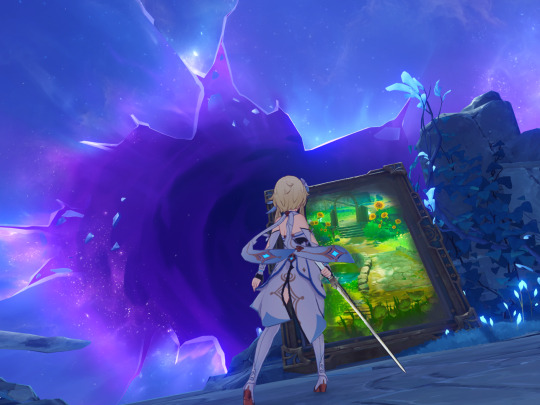
A Tale of Four Descenders
Four entered the pardes (orchard/garden)...one looked and died, one looked and went mad, one looked and cut down the saplings (apostatized), and one came in peace and left in peace [1].
This Jewish legend appears in multiple locations throughout the Talmud and its commentaries, and is associated with two pre-Kabbalah schools of Jewish mysticism known as Merkabah (chariot) and Hekhalot (palaces) mysticism. Both depicted visions of the throne of God (chariot) and the heavenly palaces, and provided instructions for how one might ascend to heaven to receive some kind of revelation or knowledge. The orchard/garden represents esoteric Torah (Jewish law) knowledge; this is why the euphemism for apostatizing is to “cut down the saplings.” (I know he says “blasphemy” (which is different), but this is reminiscent of what Dottore says at the end of Winter Night's Lazzo.)
The pardes legend first appears as a warning to scholars about the consequences of teaching about the “chariot” to disciples who are not ready. Though it's not mentioned in this specific text, this process of meditating to ascend to the palaces of God is referred to as “descending” in the writings of the Merkabah mystics [2]. In other words, this legend tells the story of four descenders.
In the conclusion of the Sumeru Archon Quests, Nahida tells the Traveler about the existence of the “Descenders." Based on the information she got from Dottore in exchange for her Gnosis, she shares that:
Descenders are “external beings, ones that don’t belong to this world”
There are at least four of them, and the Traveler is the fourth
According to the Fatui, the Traveler's twin is not a Descender
The Traveler is not recorded in Irminsul, but their twin is
Nahida speculates that the First Descender is the Heavenly Principles, but the identity of the second and third are unknown to her. At that point though, we still didn’t know what it was that Descenders do, or what the exact criteria for being one is, only that it couldn’t be as simple as just being from outside Teyvat.
The Fontaine World Quest series about the Narzissenkreuz Ordo fills in some pieces of the puzzle; specifically an additional criterion to be a Descender: they must be someone with a will “that can rival an entire world.”
In retrospect, Inversion of Genesis also hinted at the role of a Descender; The Traveler witnesses the results of someone attempting to change fate and/or the world and failing.
Nahida: Changing the world, changing the past, changing the fates of other people... These are not simple things to accomplish. Nahida: What you were looking for is complete annihilation... But this is just a fantasy. Even if The Balladeer is removed from existence, the world will not heed your will. (Inversion of Genesis)
For most people, actually “changing the world” is impossible. But for a Descender, it might be different.
Will
...Though the results are nothing impressive, this is because the object they chose was pure elemental force, which lacks any will whatsoever. Like the difference between the Director (Lyris) and a Hydro Slime, perhaps? ...Actually thought of a possible breakthrough during the process... Even though the calculated result is unchanged, but if the refinement method is reflected... If the power of... then maybe we can extract the "will" within. Using this method... resist the impact… (Excerpts from Rene's Investigation Notes)
...The true source of the mysterious power unique to this place that the locals call Khvarena is unknown. But based on its ability to eliminate or reverse the influence of the Abyss (in fact, it is a type of annihilation reaction), the two powers are of the same level, that is to say, they are of the same order in terms of rules... ...In other words, both possess the power to "re-write the rules"... ...Regrettably, be it Abyss or Khvarena, all current users are stuck in an "unconscious" stage of being influenced and overwritten by their power… (Bizarre Transcript)
The Gavireh Lajavard region of the Sumeru desert introduced us to the writings of Rene, a precocious researcher with world-saving ambitions and not nearly enough adult supervision, as well as his only slightly Abyss-corrupted bestie Jakob. Like the Khaenri'ahns before him, Rene was searching for a power that had a “will,” believing it necessary to save Fontaine from an unspecified disaster that we would later learn is The ProphecyTM. During their time in the desert (which was right after the cataclysm), Rene determined that both Abyssal and Khvarena power have a will, but pure elemental energy did not.
Some time after their trip to Sumeru, Rene and Jakob would found the Narzissenkreuz Ordo, with the goal of finding a way to save Fontainians from being dissolved in the primordial sea-laced floodwaters. They would do this by dissolving all humans in Fontaine with primordial seawater in a controlled manner, melding everyone together into one Oceanid-like being to survive the apocalypse (think Human Instrumentality Project from Evangelion). Rene had predicted the coming apocalypse with something he called his “world-formula,” and in addition to predicting the doom of Fontaine, it also informed him that “unlike the world depicted in these ancient texts, there will be no more new civilizations born.” The only way this could be changed would be by introducing a new “‘variable’ from outside the system” into the formula (Enigmatic Page 1). Rene’s goal was to become this variable, i.e., a Descender.
Four Worlds
The Tower of Ipsissimus comes from an old concept from the ancient Fontainian kingdom of Remuria, and was used to describe a powerful will that could rule, sustain, and destroy the world. This tower was designed by the Narzissenkreuz Ordo, and it represents the evolution of the human soul and the infinite mysteries of the world. The Narzissenkreuz Ordo believes that people continuously refine themselves through samsara cycles. These include Hyperborea, Natlantean, Remuria, and the first half of the fourth samsara (Khraun-Arya), which we are presently experiencing. Please take note that these are just names given to these eras by the Ordo based on ancient texts, and this evolution refers to spiritual evolution. There is no intent here to antagonize any research results obtained by the Akademiya. The human spirit undergoes the loss of paradise, the defeat of evil dragons, the original sin and baptism, and finally, freedom from the gods.
The term samsara is typically used to refer to the cyclic nature of reality, and can be used to describe concepts like reincarnation. It is not, however, referring to time loops. There is A Lot to unpack about this note, but for the purposes of this theory we will be focusing on the concept of these “four samsaras” and their relationship with the concept of a Descender, specifically that there seems to be the same number of samsaras as Descenders.
You may be wondering - this is Kabbalah world structure theory and we’ve yet to discuss Kabbalah. Well, it’s time now! But before we can get into specifics, we first need to review some terms discussed in Part 1 and then go through some basics of Lurianic Kabbalah. Ah, the irony of calling anything about Lurianic Kabbalah “basics.” Caveat that what follows will be a simplification of concepts that are very difficult to grasp (I definitely don’t know what’s going on).
Creation of the World, Kabbalah Edition Previously, we compared the “limitless light” emanated by God to create the world to the power of elemental energy, and compared the sefirot of the Tree of Life to the seven elements. The sefirot are components of this divine light (like light passing through a prism and refracting) and represent attributes of God that are used to create the world. The sefirot are traditionally depicted together in the form of a tree, which maps out their relationships with each other. For more details on the similarities between Kabbalah and Genshin worldbuilding, consult Part 1 (link) if you haven't read it yet.
Kabbalah focuses on describing the relationship between the infinite God and the finite universe and how it was created, with variations between different schools of thought. In this theory, we’ll be primarily focusing on the ideas of the Kabbalist Isaac Luria. The central idea of Luria’s philosophy was a concept he called Seder Hishtalshelut, or “Order of Evolution,” which refers to the cycles of “exile” and “redemption” (creation and destruction) the world is eternally experiencing. In the Lurianic system, time isn’t linear; the world was created in the past, but it’s also being created now.
The beginning of this Order of Evolution is referred to as the Tzimtzum, or Contraction. This refers to the contracting of the infinite God to make a space where reality could be created. Once this is created, a ray of divine light enters the void and begins to emanate reality. This is similar to the concept of the Pleroma in Gnosticism. The further the divine light gets from the source, the more it starts to break down into separate parts. More specifically, it breaks down into the Four Worlds, which represent stages of the evolution of reality, but also stages of the spiritual evolution of the human consciousness.
The Four Worlds are: 0. Adam Kadmon - Primordial (Original) Man 1. Atziluth - Emanation 2. Beriah - Creation 3. Yetzirah - Formation 4. Assiah - Action Material reality is distinct from these four worlds; the ‘real’ world emanates out of the fourth world, Assiah. Each of these four worlds have their own sefirot structure, which in themselves contain additional sefirot, on and on, like a fractal. Luria called these recursive structures “tree systems” [3]. In Genshin terms, this is like how we have Irminsul, the world tree, but also the other smaller Irminsul trees in domains.
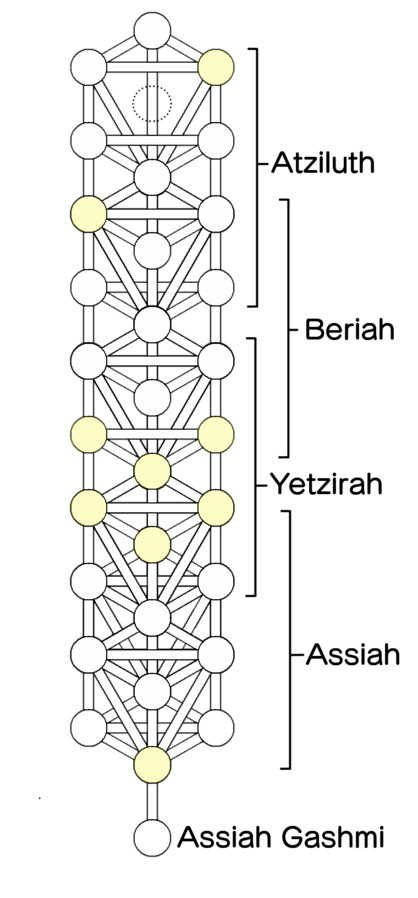
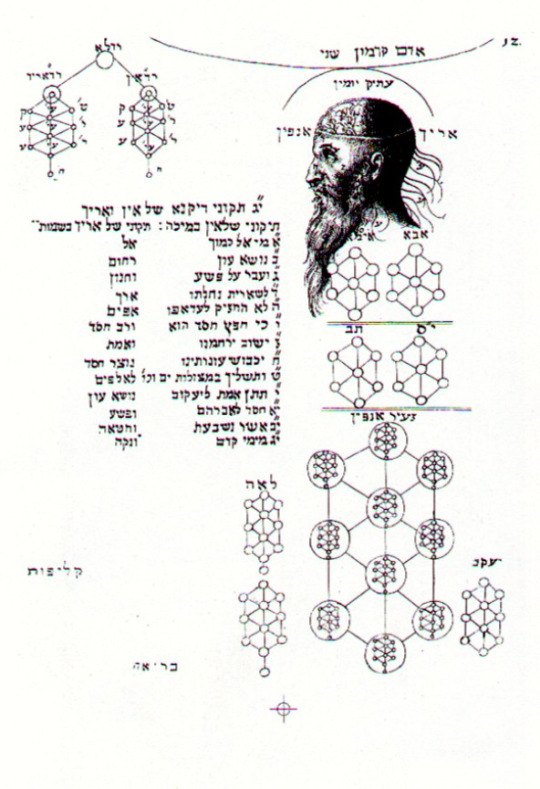
(Fun Fact: this schematic is sometimes called Jacob's ladder) The system of the Four Worlds and their nuances are very interesting in themselves, but for the purpose of this theory, we’ll be focusing on the 0th world, Adam Kadmon, and the symbolism associated with this concept in both Kabbalah and general Jewish philosophy.
Primordial (Hu)Man
The concept of an ‘original man’ is discussed in Philo’s commentary of Genesis, where he describes this being as androgynous, connected to the concept of Logos, and the Idea/Form of humanity in contrast to the ‘earthly man.’ Philo’s definition of the Logos was something closer to the concept of a demiurge-a being responsible for creation of the world. Logos literally means ‘word’ or ‘reason’, and otherwise typically refers to divine reason, or the word of God. It’s important to note that here the use of the word ‘man’ refers to a human being, not specifically a male person. Though often described as a man, the Primordial Man of Kabbalah is considered androgynous (like the Primordial One of Genshin).
The Zohar (a foundational work of Kabbalah) describes the Primordial Man as the “image of everything that is above [in heaven] and below [upon earth]; therefore did the Holy Ancient [God] select it for His own form.” The Primordial Man is the personification of the 10 sefirot together and represents a microcosm of the universe (macrocosm) [4].
Narzissenkreuz: I... I sense "reason." Visitors, are you the successors to Narzissenkreuz, or are you a threat? Narzissenkreuz: Is "Reason" that which grants you such strength? Narzissenkreuz: No, I have noticed. Have you always been in that realm that I pursue? O, you who are equal to a world! (Waking From the Great Dream) Man, as he was before his fall [first sin], is conceived as a cosmic being which contains the whole world in itself (Trends in Jewish Mysticism, pg. 215)
Lurianic Kabbalah considers the Primordial Man to be the highest level manifestation of God that can be conceptualized by humans. The world of Adam Kadmon precedes the emanation of the lower Four Worlds, but each of these worlds have their own corresponding anthropomorphic figure as well [5]. In contrast to the worlds that follow Adam Kadmon, the sefirot of Adam Kadmon are not in a Tree of Life configuration, but rather in the configuration known as “upright,’ arranged in the shape of the human body.
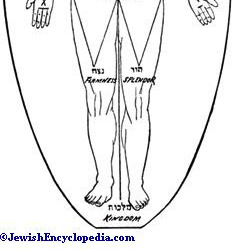
The concept of a Primordial Man exists in other religions and mythologies as well. There’s the Gnostic Anthropos, Adam Kasia of Mandaeism, the ‘Universal Man’ (al-Insān al-Kāmil) of Sufism who functions as an Axis Mundi, the world-soul of Platonism, Gayomart of Zoroastrianism, and more. The symbolism of the human body as mediator between the divine and the material world is not unique to Kabbalah. Kabbalah’s version of the World Tree and Primordial Man both function similarly to the Axis Mundi; they are the same emanations of the divine, just arranged in different configurations.
Will and the Primordial Man In Kabbalah, Adam Kadmon represents the will of God, specifically the will to create. The blueprint for the creation of the world is contained within this being/world, all superimposed together into a “primordial thought.” Within Adam Kadmon, there is no distinction between the individual sefirot, or rather, between anything at all. Everything is contained with this world/thought, but there is no time, no space, and no limitations. WIthout limitations, individual beings and concepts cannot be created. Therefore, the unity of Adam Kadmon had to be broken; specifically into the 10 sefirot, which could then assemble themselves into new configurations and continue the process of creation [6].
Narzissenkreuz: The witness of all, the recorder of all, the designer of all. Narzissenkreuz: Only one who is worth a world can bear that title. (Waking From the Great Dream) If the righteous wish to do so, they can create a world. (Babylonian Talmud, Sanhedrin 65b)
Back in Part 1, we compared pure elemental energy to Kabbalah’s divine light of creation and the ten sefirot to the seven elements. If we apply this analogy to Adam Kadmon, doesn’t a being that could (theoretically) resonate with all elements and would eventually meet their end by being broken up into many pieces sound familiar?
At the end of Act V of the Fontaine Archon Quest, Skirk tells Neuvillette that the Gnoses are actually the “remains of the Third Descender.” Neuvillette, the Traveler, and Paimon speculate that this is possible because as a Descender, they would have also had the same unique compatibility with the elements as the Traveler. Neuvillette’s character stories refer to the remains of the Third Descender as the “seven remembrances,” which were used to create a new “order” for the world, with “all fragments of the primordial…driven to devour each other.”
Rene’s notes in the Tower of Ipsissimus directly tell us that there is a connection between the concept of the Primordial Man and Descenders:
"Lies beneath the great sea" is, itself, an interesting phrase. It comes from ancient Sumeru texts, and should be read as "Narayana*," which also means "primordial human." This, too, is my goal, for not all that comes from beyond may be as one that "descends." That title belongs only to wills that can rival an entire world. That is what I seek, the way to become just such a will, one that can protect the world, sustain the world, destroy the world, and create the world.
[*Narayana (Sanskrit: नारायण, romanized: Nārāyaṇa) is one of the forms and names of Vishnu, depicted as sleeping under the celestial waters, and is associated with creation. This reference aligns with Rene’s goal of using the power of the Primordial Sea to make himself a Descender. ]
In summary, we have four Descenders, we have four samsaras, and we have four symbolic worlds that are only able to exist due to the destruction of a 0th world known as the Primordial Man, who represents the totality of the divine Will to create the world and the Idea of humanity.
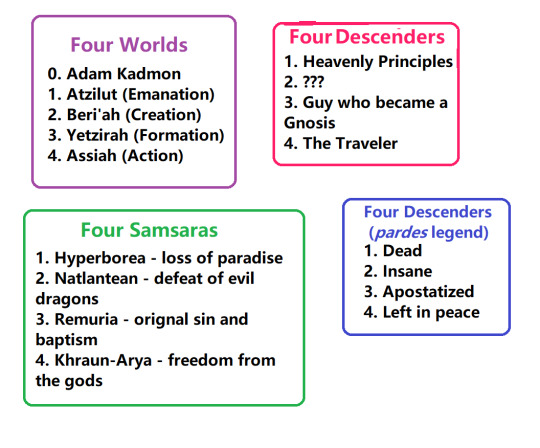
Keep all this information in mind, because before we can discuss the connections between samsaras, Descenders, and the Primordial Man, we must take a detour into alchemy and psychology.
Primordial God Impact
Genshin Impact has always been about the primordial - it’s literally in the name: 原神, or yuan shen, which means ‘original god.’ Many other in-game items share this descriptor, including primogems (原石), Primordial Seawater (原始胎海之水), and the Primordial One (原初的那一位). The same characters are also used in the note from the Tower of Ipsissimus when referring to the ‘primordial human’: 原初之人, which as it turns out, is exactly the same word used for the Primordial Human Project.
The Primordial Human Project has been mentioned exactly once, in a cutscene from the Shadows Amidst Snowstorms event in version 2.3. There, Albedo refered to his doppelganger who had been wreaking havoc on Dragonspine as the “failure of the Primordial Human Project.” Albedo implied that he is the “survivor” of an experiment associated with the Primordial Human Project and considers it to be related to his origins as a creation of Rhinedottir, aka the alchemist Gold.
We know very little about Rhinedottir and her motivations. She’s a practitioner of the Art of Khemia, a member of the Hexenzirkel, is labeled a sinner and blamed for the appearance of monsters during the Cataclysm, made a dragon named Durin and sent him to Teyvat during said Cataclysm, where he caused destruction everywhere he went while thinking he was playing, and might have also made Elynas, who had a similar fate. According to Skirk, she, like Skirk’s master, is “pursuing some form of perfection.”
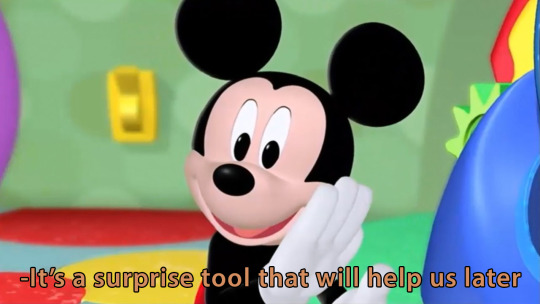
The Great Work
Rhinedottir’s alchemical research was focused on the creation of new life and she was familiar with an alchemical text called the Opus Magnum, which she left behind for Albedo to study. The Opus Magnum is a reference to the real life Magnum Opus, or Great Work, which refers to the alchemical process of creating the philosopher’s stone from the prima materia (original matter). The process typically goes as follows: nigredo (blackness), albedo (whiteness), citrinitas (yellowing) and rubedo (redness). Later Western alchemy would merge the citrinitas and rubedo steps into just rubedo, or include additional steps, such as the peacock’s tail stage between nigredo and albedo. Notably, the order of the last two steps in this process is reversed in the version of the process Albedo learned from Rhinedottir: rubedo is third, with citrinitas last.
This reordering isn’t universal in Teyvat: Rene’s notes disparage this choice, saying that Khaenri’ah is distracted from the true goal of the process:
..."Red" is the foundational principle, the philosopher's stone*, while "yellow" represents gold and mortal temptation. Yellow is simply bait. Red is the final goal. However, Khaenri'ah would likely seek the truth for gold's sake before turning that truth into a bread production pipeline…
[*This is the first and so far, only, time the phrase “philosopher’s stone” has been directly mentioned in-game.]
Rene has a somewhat ironic take on the Khaenri’ahn alchemical philosophy, given that Albedo’s character stories specifically say “Khaenri'ah was an underground realm, with precious few natural fauna. As such, its alchemy focused more heavily on the creation of life.” Rene often has strong opinions - but why would he care about the order of the Magnum Opus?
The Chymical Wedding of Rene de Petrichor
A recurring motif of the Great Work is the ‘chemical wedding.’ This refers to a union of opposites; male and female, sun and moon, fire and water, sulfur (Red King) and mercury (White Queen), etc, and is often depicted as taking place in a fountain. Here, in this drawing from a copy of the Ripley Scroll, sulfur and mercury wed and form the androgynous (like the primordial man) ‘philosophical child,’ which is philosophical mercury.

Philosophical mercury is the underlying principle or “divine flow” that makes alchemy and transmutation possible. Therefore, the goal of the Great Work was to pin down this mercury into matter through the four (or more) stages of the Great Work and make the philosopher’s stone [7,8].

"The Stone that is Mercury, is cast upon the Earth, exalted on Mountains, resides in the Air, and is nourished in the Waters." (Michael Maier's Atalanta Fugiens. 1617.) The cubes represent prima materia. ;)
The chemical wedding is also used as a motif throughout the story of the Narzissenkreuz Ordo. The Book of Revealing includes a schematic of the “Seal of Chymical Marriage,” which consists of a “Tree of Emanation'' and the “Four Orthants,” and was used to seal the Primordial Sea. The Tree of Emanation component is, of course, a version of the Kabbalistic Tree of Life - for more ramblings, feel free to check out my twitter thread here.
The Narzissenkreuz Ordo is likely intended to be a reference to the real life Rosicrucian Order, and the name of the seal a reference to an important text for this order called the “Chymical Wedding of Christian Rosenkreutz.” Other possible references to chemical weddings include Lyris being referred to as the ‘Red Empress,’ Rene using her power to dissolve himself and be reborn through the water, and Mary-Ann and Lyris fusing and eventually producing “pure water” aka Ann. Actually, when you dig into it, there are many suspicious interactions between sun and moon-coded gods in Genshin lore, as well as the doomed wedding of the Seelie and the traveler from afar. My Name For Now made a really interesting video about this, so if you would like more information and speculation, check it out here.
The Philosopher’s Stone and the Self
The philosopher’s stone is the Holy Grail of alchemy: an alchemical substance that can transmute base metals into silver or gold, make someone immortal, cure all illness, make a homunculus, and more. The stone represents perfection and spiritual refinement, either of nature through alchemy, or of the self (the alchemist) [8].
Carl Jung, the founder of analytical psychology, considered the steps of the Magnum Opus to represent the process of the individuation of the self from the collective unconscious. The similarities between his interpretation of alchemical symbolism and the ideals of the Narzissenkreuz Ordo deserve their own separate analysis, but in brief: Jung defined the collective unconscious to be the shared unconscious mind between humans, full of basic instincts and archetypes, which are primordial symbols that exist in many mythologies throughout the world. Jung compared the collective unconscious to the alchemical symbolism of water, which he describes as “wisdom and knowledge, truth and spirit, and its source was in the inner man [9].” The process of individuation separates aspects of the personality from the unconscious (the water) and then eventually integrates all components together, to form the individual self, which can now bring “order” to the unconscious (at least on a personal level)[10]. In other words, the Jungian interpretation of the Magnum Opus is that the final product, the philosopher's stone, is the Self.
If we apply this symbolism to Rene’s journey, it appears he was attempting to refine himself into a philosopher’s stone, which would explain why he was so interested in the work of the Khaenri’ahn alchemists. As he stated multiple times, his goal was to become a “primordial human,” whose will “can rival an entire world.” Rene’s philosopher’s stone is a Descender.
The Primordial Human Project
After Rene’s failed attempt to dissolve himself in Primordial Water and be reborn using Lyris’s power, Jakob turned to his own research to try to save Rene and complete his rebirth. In his log of this time period, Jakob wrote:
...I've been interpreting the data in search of a solution and sharing the results with Rene. There has still been no response, but I can already envision his response with perfect clarity: criticizing the Universitas Magistrorum for putting the cart before the horse, neglecting the fundamental principles underlying everything, and diving straight into the details of how to put those techniques to use... How they inverted even the alchemical stages for other purposes… ...It seems that there was an alchemist from Khaenri'ah named "R" who joined a secret order. From what fragmentary records exist, it appears that they made significant headway.
There are two items of note here; the first is the mention of Universitas Magistrorum, which previously had only been mentioned in a namecard description. The card description reads "O Almighty Sovereign, the Universitas Magistrorum has provided the predictions you requested: The two stars have been captured by the world's gravity…” which may be referencing Khaenri’ah’s summoning of the twins (Inversion of Genesis). From the context of Jakob’s notes, we can infer that this organization was also utilizing some form of the Magnum Opus for an unknown purpose.
The second item of note is the mention of the alchemist “R,” who is almost definitely Rhinedottir, and the “significant headway” that she and this mysterious “secret order” made. It’s very likely that Jakob is interested in Rhinedottir’s work simply because he wants to make a new body for Rene; the log also mentions Remurian golems and experiments with prosthetic limbs. However, the mention of her and the Universitas Magistrorum in the same context, with Jakob’s commentary on the reversed order of the Magnum Opus, gave me the idea that sparked this whole theory (descent into madness): Is it possible that Rhinedottir’s Primordial Human Project was intended to make a Descender?
Sometimes, very important lore gets buried in character stories. For example, the first time the term “primordial (hu)man” shows up - which is in Albedo’s fifth character story.
This art of creation was known as "The Art of Khemia." Albedo had learned of this in his youth from reading his master's notes. The next stage after "soil" is "chalk," which was also something his master had mentioned. "Chalk is the spotless soil, and was used to make primordial man." Now, Albedo understands alchemy in far greater depth than he did in the beginning, and his knowledge on the subject is far more comprehensive. "From soil was birthed chalk." The profundity of this statement is well understood by Albedo now.
Albedo is also the “chalk”; Rhinedottir gave him the title of Kreideprinz, or Chalk Prince. She seems to have a habit of naming her creations after types of soil. Durin was ‘humus,’ the Riftwolves are ‘alfisol,’ and Albedo is ‘cretaceus’. According to her, earth is “the basis of all life” and the “accumulated memories of time and lives,” so it makes sense she’d use soil as the starting material for her alchemical creations.
Albedo seems to be aware of the Traveler’s unique status, although he never names them as a Descender. During his Story Quest, Albedo studies the Traveler to get insight on how to help an alien flower bloom.
Albedo: The only other life form that, like you, has come here from afar, is the seed that I mentioned. Under the effects of Teyvat's natural laws, it isn't even able to sprout, let alone bloom. Albedo: But after I observed you, I had another idea. Albedo: Imitating you helped to inspire my alchemy, and so... Albedo: Is not nurturing otherworldly life also nurturing the world itself?
Following the experiments he performs on them, he reveals to the player that he lied about some of their test results, and even compares himself to the Traveler.
Albedo: I made a point throughout of telling them how ordinary the results were... Albedo: But what was that sediment I saw forming at the bottom of the vial? It should not have been there... What could it mean? Albedo: Those born of earth are bound by its imperfections, but those born of chalk are free of impurities... You and I are alike, both composed of a substance that has yet to be fully defined...
This leaves us with questions. Assuming Albedo is similar to the ‘primordial human’, what is his role? Is he a Descender, or is he meant to work to become one eventually, like Rene tried to do?
Let’s return for a moment to the Primordial Man and Adam Kadmon. Earlier, we discussed the symbolism of Adam Kadmon; this being represents the divine will to create, also known as the “primordial thought,” as well as the Idea of humanity. Adam Kadmon is the potential for creation unified together, with no distinctions between any concepts. Hermeticism and alchemy have a similar concept, succinctly summed up in the phrase “the all is one,” which can be found written on one of the earlier alchemical drawings of an ouroboros by Cleopatra the Alchemist [11].
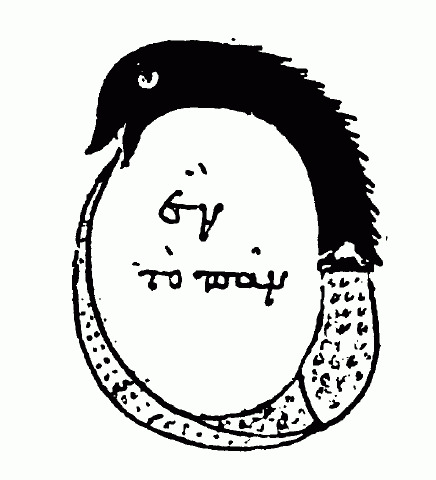
In Gnosticism and alchemy, this symbol refers to unity of all material and spiritual things, as well the eternal cycle of destruction and re-creation as things change form [12].
Rhinedottir shared this philosophy, as evidenced by the description for Cinnabar Spindle, Albedo’s sword.
Separate the dust in the flames with joy, and extract the exquisite from the crude. For all in the universe comes from a single source, and all things may be derived from a single thought.
The weapon description also contains instructions for Albedo that likely tie into his expected role as a success of the Primordial Human Project.
You must pursue that which your elder brother, the one-horned white horse, could not accomplish. Reach the far side of philosophy, and create a new destiny for myself and your brothers…
Albedo’s final assignment from Rhinedottir is to learn the “truth and the meaning of this world,” a phrase echoed by the Abyss Twin in We Will Be Reunited. Knowledge is literally power in Teyvat: both Nibelung the Dragon King and later, Deshret, utilized Forbidden Knowledge, also referred to as a “power of darkness from outside of this world”, believing it to be the only effective power to defeat the Heavenly Principles. In fact, it’s even possible that the Dragon King was one of the Descenders despite presumably being native to Teyvat. The process of acquiring the Forbidden Knowledge could have evolved him to true Descender status, although this power appears to be incompatible with Teyvat, especially in the wrong hands. The power of the Forbidden Knowledge is similar to the metaphorical garden of the pardes myth, where out of four “descenders,” only one was able to safely leave, with the esoteric knowledge gained. The philosopher's stone also represents knowledge-it is the lapis philosophorum; literally the 'stone of wisdom'. Knowledge is also how one ascends in Gnosticism, i.e, achieving gnosis.
Perhaps this is the true method to create a Descender and Albedo’s future role: once he reaches the far side of philosophy (learns the truth and meaning of the world) and ‘evolves’ and ‘refines’ himself from albedo through rubedo and citrinitas to the philosopher’s stone, he can change destiny.
This sounds familiar…
Fortuna and Evolution
Rene’s calculations of the world-formula predicted that following the fulfillment of Fontaine’s prophecy, there would be no new civilizations formed from the ruins, as there presumably had been in the past following similar disasters. Rene believed the only way around this was for him to become a Descender, and save Fontaine from the disaster, beginning a new age. It’s implied in the text of the Book of Revealing (the version in the WQ) that the fulfillment of the prophecy would spell disaster for all of Teyvat, not just Fontaine, but even if that were not the intent of Celestia, we can use this example as an analogy for the world-formula of Teyvat.
Rene directly compared the world-formula to the Remurian concept of Fortuna:
Kingdoms rise and fall, and when a civilization is annihilated, a new one will be born after from the ashes, which these books refer to as "Fortuna"... It's somewhat rudimentary, but theoretically at least, it bears striking resemblance to the computational scheme I have formulated and termed "world-formula"...
Let’s spin the wheel of Fortuna and return to the beginning, where we first discussed the four samsara cycles of spiritual evolution and the Four Worlds. Although the samsara cycles don’t refer directly to actual historical events, their names are based on ancient texts. It’s not a large leap in logic to suggest that each of the four samsaras refers to eras in Teyvat’s history- what others in the lore community have been referring to as ‘root-cycles.’ For example, the defeat of evil dragons associated with the Natlantean samsara could refer to the war between the Primordial One and the vishaps described in Before Sun and Moon, or the war between the Heavenly Principles and the Dragon King (which might be the same thing!). The events associated with each samsara must be what ends the samsara, since the fourth, Khraun-Arya, is the current, and represents freedom from the gods, which has not happened yet.
Given that the Descenders can (theoretically) change the result of the world-formula/Fortuna, it can’t be a coincidence that there are the same number of Descenders as there are known samsaras. In addition, if the four samsaras of Teyvat function like the Four Worlds of Kabbalah, that means that a samsara-ending event would be something that results in the evolution of the world. Apep says that during the war between the Dragon King and the Heavenly Principles, Teyvat was in danger of collapsing, and that the victor of the war would “inherit the right to shape the world”. This sounds a lot like Rene’s definition of a Descender: one that can protect the world, sustain the world, destroy the world, and create the world. The death and disassembly of the Third Descender led to a significant change in the “order” of Teyvat when the Gnoses were created to replace the “ruined” functions of the Heavenly Principles. Put another way, Descenders are able to evolve Teyvat into its next stage of evolution.

The fate of the Third Descender and ruined functions of the Heavenly Principles suggest another, alarming component to the relationship between samsaras and Descenders. It could be that as part of the process, a Descender must replace or repair an aspect of the mechanisms that maintain Teyvat. Don’t worry about the Traveler though; the fourth descender of the pardes legend gets to leave the garden in peace.
On the other hand, the first Descender in the legend is the one who dies, and in Genshin it’s the third, so maybe the list isn’t exactly in order. Of course, this comparison to the legend is partly a joke, but it is very interesting that the metaphor for apostatizing is uprooting trees….
Khaenri’ah’s World-Formula
We know from Rene’s notes that Khaenri’ah had their own version of a world-formula, or at least, their records contained information Rene could use to reverse engineer their predictions. We don’t actually know what he found there, but based on the name he gave the fourth samsara and the whole “freedom from the gods” thing, it seems they were trying to evolve Teyvat into the next samsara and make this freedom a reality. We also know that the Khaenri’ahns were searching for a specific kind of power, a power they referred to as both a “perpetual” energy source and a “secret from beyond the skies” that could “throw off the shackles imposed by this world's laws.” This power from “beyond the skies” is thought to be some form of Abyssal power, and the Khaenri’ahns who used it seem aware of a will contained in that power, a “dogma from beyond the heavens.” In fact, it’s possible that this power is the same as the Forbidden Knowledge brought in by Nibelung, which also had an influence on Apep’s behavior when they were infected with it after eating Deshret.
It appears that Khaenri’ah was familiar with something similar to the concept of a Descender, which makes Chlothar’s words to the Traveler in Caribert all the more impactful.
Chlothar: I never imagined that you, of all people, would deny the Abyss... How ridiculous! Chlothar: We once believed that you would bring new strength and hope to Khaenri'ah. Chlothar: To us, you were the Abyss... A wondrous mystery far beyond our imagination and comprehension... Chlothar: ...And the one who controls the Abyss can control everything! Chlothar: We yearned for that future. We looked to you to take us there.
The Future
As mentioned previously, the Four Worlds of Kabbalah are all precursors to the actual material reality, which will be emanated (created) from the fourth world. Luria believed that our world was not yet completely realized and needed another spiritual push from humanity to be actualized. (The mechanics of this won’t be discussed here - so consider this a teaser for Part 3 of Kabbalah theory.) Therefore in Kabbalistic terms, this fifth samara, this fifth world, would be the final and true reality for Teyvat.
This would be why Khaenri’ah needed a Descender or even merely a power that could defy the Heavenly Principles. That was why they summoned the twins, and why projects like the Primordial Human Project existed. It’s ironic that in their desire to remake the world in the image of their dreams, where they were free from the gods and the Heavenly Principles, they chose in the end to bind themselves to a will from beyond the sky, which ended up in catastrophe.
As the letter in the Khaenri’ahn ruins of Gavireh Lajavard says: “The gods are untrustworthy and the demons, ineffable. If there is one thing that can pry open the corners of this hollow world, then it can only be human will.”
Congrats on making it to the end! As you can see, this was already reaching a ridiculous word count, so there were some things I had to leave out, or only briefly touch on. So here are some people and concepts I pretended didn't exist so this didn't get (more) convoluted, but you should read about them: Crowley and True Will, Nietzsche and the overman, Zoroastrianism as a whole, but particularly their version of the Primordial Man, William Blake's prophecies (his Auguries of Innocence is a big inspiration for the artifact lore), Schopenhauer and Will, Atman and Brahman, Plato's concept of the world-soul, SWORDS (in Genshin lore), the Holy Grail legend, and shoutout to Otto Apocalypse the real First Descender. I do want to point out that some of the (real) people on this list, like Crowley, either were terrible people who believed terrible things, or had their philosophy used for terrible things. This also applies to other inspirations for the Narzissenkreuz Ordo. Please keep that in mind when engaging with these people's work.
On a lighter note:
Sabre’s Fun Fact Science Corner aka Miscellaneous Stuff I Need to Put Somewhere
I didn't want to have to get into explaining the lore of another piece of media but yes, this theory was inspired by a binge watch of the last arc of Fullmetal Alchemist: Brotherhood, transmutation circles and philosopher’s stone and all
On the topic of FMAB, the The Black Serpent Knights archive description states: “The long years and a curse seems to have robbed them of their reason and memory. Now, all that remains within that armor is the will to ‘fight for something, someone, and some matter.’” Funnily enough, the subtitle of the Knights is ‘Aldric’ - Alphonse Elric, anyone?
Caribert becomes the Loom of Fate to “weave his own destiny anew”, Albedo has the Cinnabar Spindle and instructions to create a new destiny - I’m sensing a theme here
Rene believed that getting a Vision was a bad thing in the process of actualizing your Will, and resulted in you selling your fate to the world. So he developed a ritual to remove a Vision from an allogene (this is only mentioned in passing by Caterpillar). So even though Albedo has a Vision, he’s not out of the running to become a Descender. But also Rene was wrong about stuff so ¯\_(ツ)_/¯
The anthropomorphic imagery in Lurianic Kabbalah can get pretty bizarre, but in a fun way if you're into Genshin lore. Adam Kadmon is described as emanating divine light out of his face, specifically his eyes, to create the next world. Genshin eyeball lore is my roman empire.
As a full elemental dragon, Apep had a “world” inside their body. Rhinedottir seems to like dragons a lot; I wonder if she considers them to be similar to the primordial human. Also, there's evidence that the Traveler's elemental abilities mimic those of the elemental dragons, rather than the archons.
References:
Toseftah Hagigah 2:2 Babylonian Talmud Hagigah 14b, Jerusalem Talmud Hagigah 9:1.
Introduction to Kabbalah and Jewish Mysticism - Part 3/14 - Merkabah Shi'ur Komah & Sar Torah
Introduction to Kabbalah and Jewish Mysticism - Part 10/14 - Christian and Lurianic Kabbalah
https://www.jewishencyclopedia.com/articles/761-adam-kadmon#anchor10
https://www.jewishvirtuallibrary.org/adam-kadmon
https://www.chabad.org/kabbalah/article_cdo/aid/380321/jewish/Chaos-and-the-Primordial.htm
https://dpul.princeton.edu/alchemy/feature/the-chemical-wedding
https://www.scribd.com/doc/11441835/The-Four-Stages-of-Alchemical-Work
Jung, Collected Works vol. 14 (1970), Mysterium Coniunctionis (1956), ¶372 (p. 278) via Wikipedia
https://en.wikipedia.org/wiki/Analytical_psychology#Individuation
https://en.wikipedia.org/wiki/Chrysopoeia
https://www.britannica.com/topic/Ouroboros
https://www.gla.ac.uk/myglasgow/library/files/special/exhibns/month/april2009.html
https://alchemywebsite.com/rosary0.html
https://www.alchemywebsite.com/rscroll.html
#geshin impact#genshin lore#albedo#narzissenkreuz ordo#rene is my poor little meow meow#tfw you write a 6000 word theory because you miss albedo so much
211 notes
·
View notes
Text
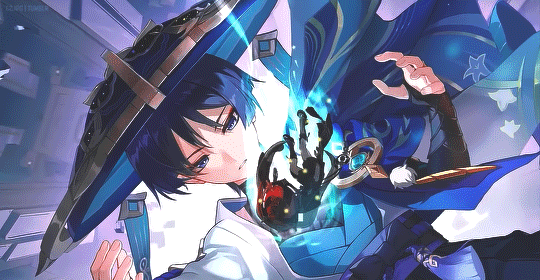
>> Angst - violent descriptions, death, blood, abandonment, huge spoilers for the Sumeru archon quest/Wanderer story quest! Extremely long. (I'll put a '☆' once it gets to the actual good part.)
Just know that I tend to switch to gender pronouns to you/yours/you're sometimes so just a heads up before you read! (  ̄▽ ̄)
Wanderer x gn!reader
Below this is the text, read the warnings/heads up before pressing the keep reading. Thank you! ( ^▽^)
The puppet, 'Kabukimono' traveled across the lands. Gently caressing the grasses he lied upon, gently reaching for the stars he saw at the midnight strike, and gently crying from the nightmares he drew.
After he met you, though.
The broad horizons felt warmer, and happier. Running to you with a smile and a basket full of soft lavender melons and how sweet and the tender taste would comfort your taste buds.
"____ look!" He pulled their wrist and leading them to a beautiful cliff of inazuma. His light veil slowly lifted off his head as their grasp grabbed it in time before it flew away free.
They gently fixed it on top of his head making sure it wouldn't fall behind. Gently pushing their hands a bit forward to cuddle him with his own soft veil.
They smiled at him.
"Be more careful it doesn't fall off again, Kabukimono." Their smile shifted to a warm one.
Kabukimono's eyes widened a bit, only for his expression to change to a happy smile broadening his face.
"Thank you, ____." Kabukimono still firmly but gently holding their hand.
Only for mere minutes, hours, days, weeks, months, years, to only pass for a few seconds. Holding onto your hand as his cold wet tears fell onto their cheeks. Cradling your bleeding body as traumatize and fear covered his once gentle face.
"Please.. wake up, cmon.." His tears stained his cheeks and fell onto theirs.
Grasping onto your consciousness only to let go and only hear the verbal screams he once tore.
"You promised you wouldn't leave me.." His face contorted into disappointment, and sadness. Unable to control his tears they fell down rapidly.
Kabukimono let's go of their body. His once sparkly and curious eyes now filled with disappointment and anger. He walked away emotionless, moving on without asking, why or who?
years passed on and on without effort, yet it still haunted him and made him cry in his own sleep once more. Whispering to himself again how he could've saved every moment with you.
It came until then he was a God, then face forwardly falling into the harsh ground, crumbling as he landed. Unable to recreate his wantings and needs.
The God of wisdom, carefully cradling and crafting memories of once who. Remembering the past and forgetting it immediately, the large platinum pink tree brightened and glowed. Gently caressing the lands of Tevyat. Carefully caring for the gentle and fragile memories it's collected.
Only for the retired 6th fatui harbinger to step foot into the irminsul, with the silver companion and the blonde Traveler; Lumine.
Small chatter and comments filled the quiet domain of the blue tree, galaxy like lands filled the outside brim forgetting about complete real reality. Scaramouche found them having a conversation to themselves and he questioned, still collecting the information needed. Saying small words and sentences to each other.
"So uh, have you found anything yet?" Paimon put her hands on her hips as she nervously glanced at him like how he knew the Traveler, Nahida and herself had a telepathy conversation.
"Still looking. Don't get your hopes up though. You and your twin come from outside this world. It wouldn't surprise me if there was nothing on either of you in irminsul at all." Scaramouche complied blankly. He still looked for information inside of the irminsul as they continued.
"...Wait, how'd you know about that? Did Nahida tell you?" Paimon questioned confusingly. She crossed her arms and continued to look at Scaramouche.
"It's not like we've never met before. And anyway, you're world famous. It'd be more surprising if I didn't know a few things about you." Completely ignoring Paimon, he didn't turn around but his gaze moved to Lumine's direction behind him.
Scaramouche still stood silent. The talking of Nahida and Lumine and Paimon all numbed in his brain like static.
After a long time of just standing there completely silent, Paimon finally broke the silence.
"Sh—shall we see how he's doing?" Her voice trembled slightly like she was hesitant. But they approached him anyways.
"Hey, you all right..?" Paimon hesitantly asked.
Scaramouche, turned around at the Traveler and companion. He crossed his arms and had a smug face on like he was up to no good.
"..Are you worried about me? If we didn't have such a history, I'd almost think that qualifies me to be your friend." Scaramouche blankly admitted.
"We just want to make sure this doesn't effect the plan." Lumine stated.
"It won't. I'll keep my end of the deal." Scaramouche said, with that blank tone still painting his tone of voice.
Scaramouche scoffed quietly as he turned back again towards the tree and stuck his arm out again to collect information once again like nothing happened.
"Hey, are you investigating the stuff we wanna know about?" Paimon asked.
"That's why we're here." Scaramouche replied. His attention was turned once more to the tree.
"But unfortunately, there's no information about the Descenders in Irminsul." Scaramouche shrugged and turned back to them. Nahida and the Traveler talked and Lumine was disappointed, as the same goes with Paimon.
"Does this info count towards my mission? It wasn't from Irminsul, but was it valuable?" Scaramouche asked to Nahida.
"Very valuable." She responded.
"Good. In that case... I'll take some time for myself now." Scaramouche suddenly smirked, and a bubble like barricade surrounded them.
"Lesser Lord Kusanali was right: My power's all but completely spent. Even if I use all of the divine power left in me, I can't sustain this shield for very long." Scaramouche continued.
"Lumine, I shared a secret with you, and now you owe me. So, in return, I'd like you to answer a question for me." Scaramouche stepped forward to them both.
"What do you wanna know?" Lumine's curiosity was somewhat piqued.
Only speaking to the Traveler, he carefully worded out
"Give me your hand." Scaramouche stuck his hand out for the Traveler to hold. He waited, but the Traveler hesitated. But held his hand anyway.
"Can you hear my voice inside your head?" Scaramouche asked. His voice echoed through Lumine's mind as she processed it.
"Are you trying to brainwash me?" Lumine asked, completely ignoring his question, but somewhat answering it at the same time.
"No, l cant do anything like that anymore. At most, all l can do is exchange a few words with you." Scaramouche blankly said.
"So tell me: in this world, is it possible... to change the past?" Scaramouche asked sternly. It set Lumine off a bit.
"Wait, why would you ask that...?" Lumine responded. He was definitely up to no good whatsoever.
"Done." Scaramouche let go of her hand and the bubble disappeared. Paimon was completely clueless as she just floated there, next to them.
"Huh? What the.. What happened? Paimon only saw you hold hands for a second.." Paimon pointed out. Lumine thought for a second until he looked at Paimon.
"Nothing. I was just thanking her for helping me." Scaramouche said blankly, but a smug still painting his expression.
Lumine thought for a second, and then he turned around and walked away towards the tree.
"So long. I suggest you get yourselves out of here quickly." Scaramouche said. He approached the tree.
"Wait— where are you going!?" Paimon exclaimed. They both went running after him, but he disappeared.
"Don't do anything stupid!—" Paimon yelled out. Her voice echoed through the domain and Lumine and Paimon both went looking for him. After a while, he was no where to be found. Only to realize, he erased himself from existence.
☆
days later after his existence was erased, he met with the Traveler, but he was no long the Scaramouche Lumine once knew. He was Wanderer. They quickly resolved that matter into their own hands, reiving the memories of few.
It came until then, he finally remembered you. He totally had forgotten about the person he treasured most. The person who shared a community to show him the love and attention he has now. He still drowned in his guilt, knowing you were dead. Only to be drowning in the memories he once had when he was kabukimono.
"I'm going to get fresh air, Lesser Lord Kusanali." Wanderer put his hat on and looked at Nahida. Nahida had a blanket on the floor as she had some books beside her. She lifted her head towards him, and she smiled.
"Alright, but no need to call me that anymore. Don't go fooling around though, Hat guy." Nahida chuckled.
"Enough with the nickname, anyway bye." Wanderer scoffed and he left. The large door opened, and then closed, leaving an echo in the large sanctuary. Nahida's soft smile still lied on her face, and she went back to reading. Tiny glistening and soft sounds barricaded the outside of the sanctuary.
Wanderer walked out the Sanctuary of Surasthana and exhaled. He stepped down the stairs and walked some more, and then some more.. and then until he couldn't even recognize his surrounds.
"Where the hell am I?" Wanderer looked around his surroundings, of course he was still in the city, just... somewhere he wasn't in before. He went to look around for someone to ask.
He looked down at his pocket, and took something out. It was a tiny puppet. The fabric was soft, and the puppet had soft clothing. Dark indigo hair with flat bangs covered the front, wimpy closed eyes with a single tear drop at the side of the eye. He smiled softly, and it was genuine. The tiny puppet, he made with an old lady. He never met the old lady before, but the lady taught him how to knit a puppet of his own. This one resembled the one he was once given in the past, that was now gone. (Reference found in his story 4)
He exhaled, knowing he'll never see them again, and especially.. you. He sat on a bench looking at the people of Sumeru walking by. Still firmly but gently holding the puppet. Time had passed quickly, and the sun was now over dawn, and the gentle dusk was arriving. He hummed to himself.
His eyes widened when he lied his gaze on a certain figure.
"Wh..." Wanderer's eyebrows furrowed, he shoved the puppet in his pocket and stood up.
"You're... no." Wanderer blinked and then blinked again. Then again, and then again, and then again. He hadn't felt his feeling for a long time. Tears glistened from his eyes.
He ran towards the figure pushing away from the small crowds and didn't hesitate.
He was so close, and he engulfed the stranger with a hug.
"Wh— who?—" the stranger and Wanderer tripped a little until they got a steady balance. His hat fell on the floor.
"Hm?" The stranger looked up at the person, it was wanderer. Hugging them from behind and hugging them tight against his chest. His head lying on their shoulder.
"Have we met before?" The person turned their head and gave Wanderer a warm smile. Wanderer lifted his head and looked at them.
His expression was normal, but then immediately contorted into his furrowed eyebrows and his slightly agape mouth.
"No it can't...—" Wanderer hitched his breath.
"Do you have the wrong person?" Their warm smile changed into an awkward one. A feeling of nostalgia washed over them, like this had happened before. But where? When?
Wanderer looked at them, tears falling down his face.
"Wha— are you okay?!" The stranger suddenly panicked and they both suddled down a little. They both sat at a bench as Wanderer sniffed through his tears.
"I'm sorry for the sudden outbreak. You just reminded me of someone." Wanderer apologized. But he had to make sure, he had to make sure—
"It's okay it's okay! I was just kind of lost around Sumeru city, you seem like you know your way around here." The person pointed out.
"Oh uhm, no. I was just lost as well." Wanderer awkwardly said.
The person chuckled and continued to talk. Wanderer had to make sure. The way you talked, the way your hair looked, the way your eyes glistened and the way you just.. looked at him. It was like you were talking to an old friend, but you just met him.. right?
"Oh! I'm sorry I was rambling, was I wasting your time?" The person came in an abrupt stop in their sentence and looked at Wanderer in slight worry.
"No, you're not. Keep talking." Wanderer chuckled and gave them a small smile.
The person stared at Wanderer, their expression softening. Has this happened before? It felt like it's happened multiple times, so many times.
From afar, Nahida was watching them both. Blending in with the small crowds of people, she walked and looked at them with a soft gaze.
"Oh? Okay then! And apparently in Liyue they have really good teas, I feel like you'd like ones that are especially bitter. I'm sorry if I'm assuming but I just feel like it." They talked cheerfully at Wanderer. Wanderer was so blinded by listening to them talk he didn't even know his big softie side was showing.
"Oh I almost forgot to introduce myself! My name is ____." They added.
Wanderer's smile faded. And he looked at them. He didn't hesitate to ask but he sat up more straight and his mouth began to open.
"Can I hug you?" Wanderer gently asked.
"Hm? Okay." They said. They opened their arms and Wanderer didn't hesitate to come into their embrace. His arms wrapped around their waist and he hid his head in their shoulder. Gently sneaking his hand cupping the back of their head with it.
"It is you." Wanderer gently muttered.

For the people that read the part of him in the irminsul with the Traveler and paimon the dialog comes from the actual game so credit to them!! And some other small references put in it. I hope u enjoy the angsy 🫶🫶
@kaahgyuya 9/24/23 12:01 pm
#genshin impact#genshin x reader#wanderer#kunikuzushi#wanderer genshin#wanderer x reader#genshin angst#genshin anemo#angst genshin#genshin impact angst#genshin imagines#wanderer headcanons#scaramouche headcanons#scaramouche x reader#scaramouche x you#scaramouche angst#the balladeer#kabukimono#genshin kabukimono#wanderer angst#kabukimono x you#kabukimono x reader#kabukimono angst#angst with a happy ending
359 notes
·
View notes
Text
It's something that I want to do a full write-up on after I finish more more quests (most especially Baizhu's) but I just want to put it out there that I am constantly amazed, as a chronic-illness haver myself, how many characters in Genshin Impact have chronic illnesses, how visible they are, and how well represented they are.
Like, it's extremely difficult to find even one character in a piece of fiction that has a chronic illness (let alone one where it isn't played for laughs, OR otherwise it completely destroys their life and they're fucking miserable, OR it's magically cured).
But Genshin? Dude you trip over a character with a chronic illness every five seconds, it feels like, and I fucking love that. Off the top of my head there's:
Anna (Mondstat), who visibly suffers from her illness and we know her brother struggles to pay for her medicine. But the traveler, through a series of quests, helps them get ahold of an affordable medication to manage (MANAGE, not cure) the illness and to return her quality of life to her.
Little Hongdou (Liyue) - who has an unspecified chronic illness. And she just does. But she's out and about and seems very happy.
Collei (Sumeru, playable) - and sure her illness is fixed by the end of the Sumeru quest, but I don't even care because of how well it's represented. She has hopes, ambitions, dreams. She participates in her work as a forest ranger even though we get visible confirmation that her illness is progressing. The people around her care and are compassionate, and do their best to make sure she takes care of herself, but she is also allowed to just...go out? and do things?? This shouldn't be such a tall order but chronic illness-havers with friends and family members who understand that, hey there are good days and there are bad days -- that's rare in fiction (and IRL for that matter).
Dunyarzad (Sumeru) - her chronic illness is a major plot-driver in an entire fucking archon quest. She has a huge amount of influence on the people around her, and her chronic illness is actually part of the whole reason we even are able to help Nahida in the first place. Her chronic illness is what makes her instrumental to the plot, but it also isn't the only thing about her, and I love that.
Dulphy (Fontaine) - an actress from Furina's story quest. What really struck me about Dulphy is how the people around her interact with her. I was half in tears by the end of the quest -- not even for Furina reasons (yes, that too), but because I was so touched by the fact that a game gave us a character who was unable to follow through with something she said she was going to do (finish her closing performance as the lead actress in a musical), and that was okay. Like, yeah, the people around her were upset -- but they were upset because she hadn't taken great care of herself and had pushed herself past her spoon limit! Nobody (including the narrative itself) treated it as a great failure when she had to call it quits on her performance. Rather, that was treated as a good thing, and they went so far as to explicitly state that her performance up to that point mattered, and that it was a meaningful contribution, even though she couldn't finish. And that just fucking got me, man. Also - again, this is a character where it is explicitly stated "this is a chronic illness. It has good days and bad days and it can only be managed, not cured. And if she pushes herself too hard then she'll need several days to recover." And that's just...part of who she is.
And, of course, Baizhu. (Liyue, playable) My beloved, my blorbo. His chronic illness(es) is an extremely visible part of his character - referenced in his voicelines, his idles, his interactions in quests, the imaginarium theater, and even your teapot house, and his emojis. Hell, he even coughs if you sprint too much with him. Nevertheless, he's arguably one of the strongest healer units in the game from a meta perspective, and from a story perspective he is immensely successful, insanely compassionate, and while he isn't necessarily super kind to himself about it, the people around him are. His chronic illness is part of him, but he is still allowed to inhabit a story where he's the most renowned and beloved doctor in his entire country & just...is an awesome, active person in general, and that means so much to me.
Just. God. I legitimately can't think of another piece of fiction where I have seen myself represented over and over and over again everywhere I look, let alone so kindly. It's genuinely so moving to have so many characters be so visibly chronically ill, and for that to just be part of their character. A neutral thing about them. And to have it be okay when they can't finish things -- even though they said they would, okay when they need to rest, okay when they have to take a break or extra care with themselves. And not just one but so many. I'm sure I'm forgetting some to boot.
(Honorable mention: Qiqi. Like sure she's a zombie but hear me out: visible chronic joint and memory issues, which is something I also deal with and it's just so refreshing to see a character who deals with them, too -- and who has so many people around her who are so kind about it).
#i said i wasn't gonna do a full write up and yet this got super long#it just hit me after playing Furina's quest last night#there are just SO MANY of them#Genshin Impact#chronic illness#baizhu#qiqi#collei
44 notes
·
View notes
Text
[3.8] Technology as a False God: On "Evolution," the Duality of Machines, Replication, and Wisdom
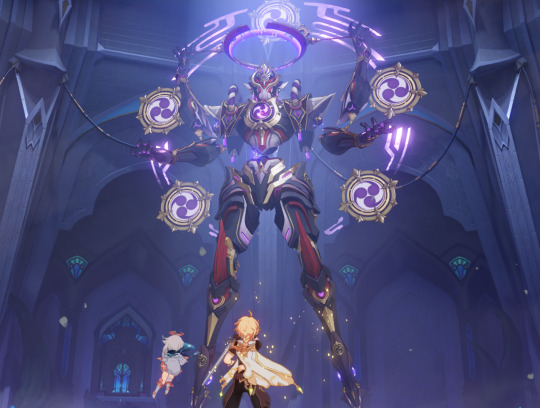
“To recognize untruth as a condition of life: that is certainly to impugn the traditional ideas of value in a dangerous manner, and a philosophy which ventures to do so, has thereby alone placed itself beyond good and evil.” –Friedrich Nietzsche, Beyond Good and Evil
Before we move on to the nation of justice, I want to do one last inquiry into the narrative significance of machines and technology in Genshin’s 3.x patch cycle. Here, I’ll discuss how divinity (or “godhood”) and technology are treated as interchangeable tools to surpass fate and the boundaries of mortality, the potential problems with treating them this way, and propose an alternative relationship between humanity and technology as illustrated through Karkata, Benben, Tamimi, and Mehrak. By foregrounding machines, we learn something intriguing about ourselves and the “truth” of this world as we perceive it.
SPOILERS: All Sumeru Archon Quests, Caribert, the Golden Slumber and one out-of-context screenshot from Dual Evidence, the Dirge of Bilqis and its post-quests, Khvarena of Good and Evil, Nahida’s second Story Quest, Faruzan’s hangout, an out-of-context screenshot from Baizhu’s Story Quest, and major spoilers for Persona 5 strikers at the end. Also some dialogue from Shadows Amidst Snowstorms and A Parade of Providence, two limited-time events from 2.3 and 3.6 respectively.
Disclaimer: I have tried my best to write this post so that it stands on its own, but because it is still a sequel it will probably make the most sense with the context of part 1. Here are the previous posts leading up to this one:
Part 0: On Dreams, the Abyss, Forbidden Knowledge, and Wish Fulfillment
Part 1: The Uncanny, Fate and the Machine
Terminology: Machine is sometimes used interchangeably with “technology” in this post.
Technology or tool here is referring to technologies specifically used to pursue a wish like immortality in the face of existential dread, not the use of technology or medicine (which I do not address here, and is very difficult to separate from the former) to facilitate someone’s life who could otherwise not survive without that technology, or would have a more painful lived experience without it.
Also, though I don’t engage directly with “A Cyborg Manifesto” here, Donna Haraway’s ideas have greatly influenced my own over the years since I read her in college (although I mostly disagree with her on many points, or at least don’t go as far in boundary deconstruction as she does). I owe my interest in technology studies to her and that piece. Her essay is linked here and at the bottom if you would like to read it.
(and finally with many, many, many thanks to my boyfriend for multiple beta reads despite not having played a single Hoyoverse game, helping me work out the philosophy bits and contextualizing them in history, and encouraging me to finish this)
TL;DR: Machines are friends, not food!
No Matter the Cost
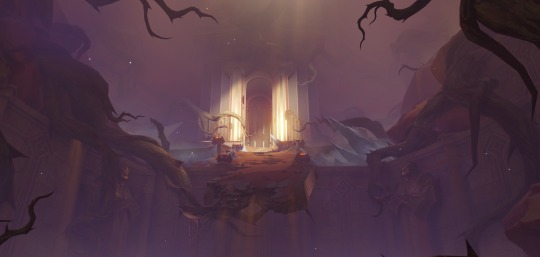
“...Perhaps it is as the notebook says, and we can find a power that transcends even that of the Abyss — the power of ‘evolution’...” -Records of Unknown Attribution (I) “Life, death... and the world around us all follow a set of laws... Hehe, but if you never test the limits, how can anyone know where the boundaries of these laws are?” -Baizhu Voicelines, Chat: Natural Laws “...Even the ominous thing that came down from the heavens shall be ours to use…” -Hyglacg, Shadowy Husk in the Chasm
Without a doubt, the star of this patch cycle is Khaenri’ah, which lurked in subtext and allegory in the Archon Quest, haunted Sumeru’s landscape with its massive defunct Ruin Golems, and finally smacked us in the face with its physical location in Khvarena of Good and Evil..
We already know that Khaenri’ah was a nation that put its faith not in the gods but rather in human ingenuity and technology, and that they ultimately attained a power so great that they “almost touched the dome of the firmament.” They did this by researching increasingly dangerous energy sources for their numerous mechanical creations, the Ruin Machines we are all too familiar with by now. They started out with Azosite, a Ley Line-based elemental energy source that powered their earliest Ruin Guard models, like those scattered around Devantaka Mountain.

Nasejuna: This giant furnace is used to make a substance known as Azosite. It is the core of this entire factory, and the Energy Blocks we saw earlier were derived from this place.
But this energy source proved inefficient and therefore inadequate for Khaenri’ah’s goals, which led them to seek a higher power from beyond the skies that could fuel their larger machines with perpetual energy. This likely is the bridge between Khaenri’ah’s fate and Chlothar’s mysterious remarks in Caribert about the Abyss Sibling:
Chlothar: We once believed that you would bring new strength and hope to Khaenri'ah. Chlothar: To us, you were the Abyss... A wondrous mystery far beyond our imagination and comprehension... Chlothar: ...And the one who controls the Abyss can control everything! Chlothar: We yearned for that future. We looked to you to take us there. Chlothar: But what did you bring us instead?
Though Khaenri’ah presents itself proudly as a godless nation, it may have been founded around the time when the celestial nails dropped in Teyvat’s first forbidden knowledge pollution event, which destroyed the unified human civilization. As potential survivors of this devastating act by the Primordial One, Khaenri’ahns then settled in a lifeless land without plants or animals of its own, and they hoped to build something there that belonged solely to humanity. The Heavenly Principles had turned on the world’s earliest humans, and they were powerless against them. Chlothar’s words betray the scars of this trauma on Khaenri’ah, as well as their desperation to control their fate by looking to the Abyss.
As a brief refresher from the previous part, we discussed how the German word heimlich denotes “the home,” all that is familiar and known, while unheimlich (uncanny) refers to all that is unfamiliar and external to the home, such as the wilderness. The Abyss sibling and the Traveler are external variables to Teyvat, making them otherworldly, unfamiliar entities full of potential to surpass Teyvat’s natural laws. Although the Abyss sibling is not a god per se, they were probably as close to a god as Khaenri’ah ever had, because to them the sibling embodied the higher power they were searching for, and they saw that “godliness,” a sort of functional divinity, was yet another technology for them to master. In this way, the Abyss sibling (and their functional divinity) was a powerful tool for Khaenri’ah’s desired end, the “future they yearned for,” a being who could deliver them to the end of their suffering under the Heavenly Principles.
It’s similar to what King Deshret represented to Rahman and the radicals in Archon Quest. The hopelessness of Sumeru’s situation before the Archon Quest’s conclusion is an allegory for the position humanity finds itself in under the rule of the Heavenly Principles, with the Akademiya symbolizing Celestia and the desert dwellers symbolizing Khaenri’ah. The material consequences of the Akademiya’s rule on their lives created a dangerous situation for the desert, and those most desperate to change their fate were willing to believe in the impossible:
Dehya: …The rougher life gets, the more they wanna believe in King Deshret. Way they see it, King Deshret’s resurrection is their only chance at overthrowing the Akademiya. … Dehya: Sumeru is run by wise and mighty sages. To them, us desert dwellers are nothing but tools that can be used and discarded at their whim. Dehya: We’re cheap labor. Like livestock, but easier to control…Nothing more. …
Rahman: We’ve waited a long time for this day to come… The sun and the moon no longer shine here. All you see now is cracks in this desiccated land. But, fate has finally dealt me a hand to play against the Akademiya.
Rahman: With these scholars in our custody, we’ll stomp the Akademiya’s forces and fight our way beyond the Wall of Samiel.
Like the Abyss sibling, Deshret’s divinity is both a nebulous symbol of hope and also the means to an end, a tool or “technology” for surpassing fate.
Celestia is untouchable, unconcerned with mortal lives, and the boundaries that govern humanity leave no room for them to negotiate their rule:
"Resolve, valor, love, hate...they will all twist in the river of time. But the 'rules' will never change." –Magatsu Mitake Narukami no Mikoto, Living Beings
Instead of bowing to Teyvat’s laws, Khaenri’ah pushed them to their limits. The cost of their failure spelled the end of their nation as they knew it, polluting Khaenri’ah and Teyvat with forbidden knowledge again.
And speaking of forbidden knowledge pollution, let’s talk about Apep’s role in Nahida’s second story quest, because if all that wasn’t enough, the metaphor becomes quite literal in Apep’s case. Nahida’s second story quest is many things, all of which will be extremely important in Fontaine when we deal more directly with the idea of forms, the Self, and mirror images, but its most useful application to both Sumeru’s story and the overarching main story is the allegory of Apep swallowing Deshret.
In exchange for allowing him to establish his kingdom in the desert, Deshret promised to pass all of the knowledge he learned to Apep once he died. When that day did come, Apep literally ate Deshret’s body in order to assimilate his knowledge (or memories) into its body. Little did Apep know, this was all Just As Deshret Planned, and its body became a containment zone for the lethal forbidden knowledge he accumulated after the Goddess of Flowers’ death.
Apep’s goal was, and still is, to overthrow the Heavenly Principles that took Teyvat from it and the other Sovereign dragons, and using Deshret’s knowledge was yet another stepping stone to achieving this goal. Seems a little similar to Khaenri’ah, right? It’s even in the title of its boss music: “God-Devouring Mania.” This idea of not just utilizing divinity as a tool, but also metaphorically consuming it as an energy source, like a predator would consume its prey, is crucial to understanding its purpose as an aid in a larger project of “evolution.” (Edit: in other words, it’s all about power).
Drink Not That Bitter Salt Water
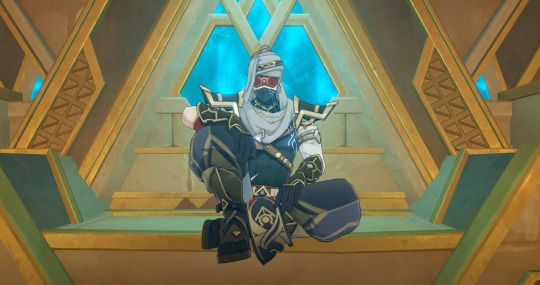
“Flesh decays, and with it decay all martial arts mastery and all poignant memories. Perhaps only by converting one’s four limbs and body into sturdy mechanical parts, and by at last sacrificing one’s very own heart for a sophisticated mechanical one, can one transcend the impermanence of the fleshly form…” -Marionette Core Item Description “A reptile that has mutated after feeding from greater lifeforms. Majestic beasts are sometimes revered by human beings as the embodiment of a greater power, their visages turned to analogy to feed in reference to a person, feeding their ego. However, the majority of beasts that have absorbed the "greater power" were slain by the overwhelming nature of the power itself. Only a few among their number evolved new forms.” -Consecrated Horned Crocodile, Living Beings Video still from WoW Quests
As it turns out, the relationship between divinity and technology to humanity is not just unidirectional, but interchangeable. Let me show you what I mean.
In the Golden Slumber world quest, the Traveler wanders through the ruins of King Deshret’s civilization in search of a novel area of research for Tirzad’s paper with Jebrael and Jeht, two members of Tirzad’s hired investigation team. In the depths of King Deshret’s mausoleum, they stumble upon Samail, who is collaborating with the Fatui to locate King Deshret’s secret, the Golden Slumber.
At the conclusion, Jebrael and Samail actually reach that “place” after arriving at Deshret’s throne in Khaj-Nisut. In order to save Jeht, Tirzad, and the Traveler from the encroaching Golden Dream, Jebrael joins Samail in the sea of consciousness:
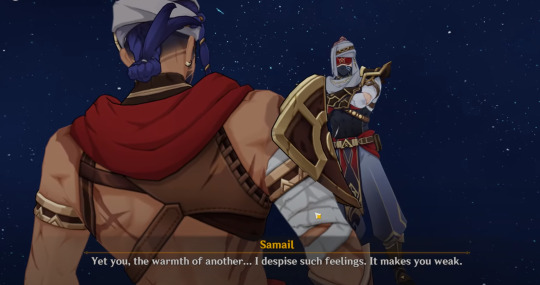
Jebrael: I'm inside... the Golden Slumber promised by Al-Ahmar? Samail: Oh... You are not "us" yet. Samail: ...It's fine. Soon, there'll be no "you." "You" will become a part of "us." This meaningless talk will be unnecessary then. … Samail: You should obey. Al-Ahmar's will is our will. The Thutmose's dreams are our dreams. Jebrael: No! Ufairah taught me that I'm not just some part of you, I'm an independent person! I have my own dreams... I won't go back! Samail: Jebrael, why don't you understand? Love is just a fever. I even eliminated the infection for you. Has the heat made you lose your mind? Jebrael: You're the one who's lost their mind, Samail, not me. The Golden Slumber that Al-Ahmar promised us isn't like this... It's not a sad place with only "we" and no "I." Samail: I'm not sad. I know what I want. My dream is to be one with the Thutmose. Samail: Yet you, the warmth of another... I despise such feelings. It makes you weak. Video still from WoW Quests
When they worked under Babel, Jebrael saved Samail from an assassin Babel sent in their exploration of Gurabad. Classified as traitors of the Tanit, Samail and Jebrael then founded the Thutmose Eremite faction together and were the only meaningful connection each other had until their first attempt to uncover Deshret’s secrets. On this expedition, Jebrael met Ufairah and had their daughter Jeht together, further pulling him away from the Thutmose and from Samail. Samail then kills Ufairah in one final attempt to make Jebrael stay, but even this is not enough, and Samail fails to “possess” him in the end.
Samail’s loneliness and despair then drove him further toward the Golden Slumber of his dreams, where he would never truly be alone again. He resents Jebrael’s attachments to the material world and likens them to an illness because these attachments are what make him an individual and prevent him from returning “home.”
It doesn’t really matter to Samail what King Deshret’s original intent for the Golden Slumber was, because he needed to appropriate the project for his own subconscious wish, his own intent to transcend his flesh and become “one” with his departed god’s dream, indeed to merge with Deshret himself. If rationalizing this wish required confounding it with Deshret’s, so be it. With the Golden Slumber’s technology, he could consume everyone and everything.
Rahman and the radicals relied on both the technology that (falsely) promised Deshret’s resurrection and Deshret himself to deliver them a brighter future, but here Deshret and his technology are more difficult to separate from one another. His divinity is technology in this sense, and using that technology allowed Samail to surpass the boundaries normally imposed on mortals. Though his and Jebrael’s bodies died in the material world, their consciousness is now infinite in the Golden Slumber.
Babel’s motives in the Dirge of Bilqis were also quite similar to Samail’s. After opening the path to the Eternal Oasis, her true intentions to monopolize the oasis and overthrow the Akademiya came to the surface:
Babel: Whether she is alive or dead, whether she can or cannot be resurrected... As long as the Eternal Oasis is under my control, all such things will be mine to decide. Babel: I shall be the sole Prophetess of the slumbering goddess, the Tanit's law shall be divine edict, and the prosperity of the Tanit shall be the pre-ordinance of her divine oracles.
In the Golden Slumber and the Dirge of Bilqis, the focus shifts from what a god can offer humanity to what their technology alone can offer. Though this distinction is subtle, it is important for solidifying that technology is not only a tool humans use to appropriate divinity, but that it is also seen as a form of divinity itself. What Babel and Samail hope for is not to resurrect a god or to create one, but in effect to become a god through their use of technology. To humanity, divinity is a technology, and in technology it sees divinity.
God Devouring and Rheingold* Gathering
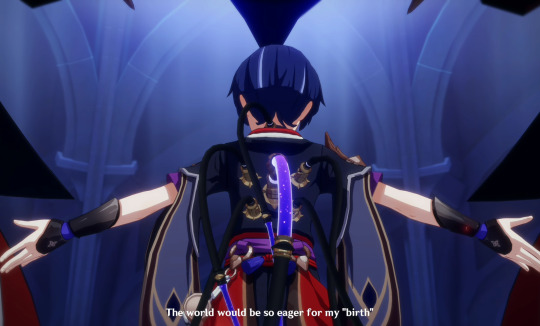
“An arthropod that has mutated after feeding from greater lifeforms. Lifeforms are governed by the laws of evolution, Consecrated Beasts exploited these rules by being fortunate enough to discover a long-dead carcass of a greater being before any of their competition ever did. Animals and humans often have far more in common than the latter is willing to acknowledge.” -Consecrated Scorpion, Living Beings “...Zandik and I discussed the traits of local plants and animals. We also exchanged views on their evolution models. We had a great time and decided to go on a picnic tonight…” -Sohreh’s Note
So, why machines? Why is technology the vehicle of choice to consume divinity?
To start off, machines present a fascinating ontological dilemma for humans. Let’s begin with the first problem they pose.
Although there are many ways to embody a human experience, what all humans have in common is a finite lifespan. The impermanence of life, and our awareness of that impermanence, is central to the existential question of the meaning of our existence. In our attempts to locate that meaning, some turned inward and asked: what makes humans different? And Cartesian dualism answered: humans are different because we have an immaterial soul that allows us to reason.
However, in L’Homme Machine (Man a Machine), French materialist and ex-physician Julien Offray de La Mettrie posited another theory of the body that ran counter to this narrative. Very generally speaking, materialism is the philosophical view that all phenomena are a result of matter and material interactions. To materialists, matter is the fundamental nature of reality itself – if it is not composed of matter, it doesn’t exist. He not only saw the body and soul as one and the same (what philosophers call monism), but also as analogous to a machine, a view that Descartes reserved only for non-human animals. In other words, Descartes argued that thought originates in an immaterial “mind,” while de La Mettrie reasoned that we think through our bodies, and that this makes us no different from other animals or a machine.
Though his examples weren’t especially scientific, the move to extend Descartes’ analogy back to humans is upsetting to some due to the lack of privilege it affords the human subject. If a human is no different from other animals, if there is no immaterial soul or “mind” that distinguishes us from them, then what makes humans special at all? In de La Mettrie’s words:
“We are veritable moles in the field of nature; we achieve little more than the mole’s journey and it is our pride which prescribes limits to the limitless. We are in the position of a watch that should say (a writer of fables would make the watch a hero in a silly tale): ‘I was never made by that fool of a workman, I who divide time, who mark so exactly the course of the sun, who repeat aloud the hours which I mark! No! that is impossible!’ In the same way, we disdain, ungrateful wretches that we are, this common mother of all kingdoms, as the chemists say. We imagine, or rather we infer, a cause superior to that to which we owe all, and which truly has wrought all things in an inconceivable fashion (de La Mettrie, 146).”
This “uniformity of nature” (de La Mettrie, 145) has a horrific quality to humans. We assert that we are better than what has created us, that we are superior to other animals, in order to repress the despair of a meaningless existence. It is in no small part what motivates Scaramouche to offer his mechanical body as a test subject in the god creation project, so that he too could attain his destiny:
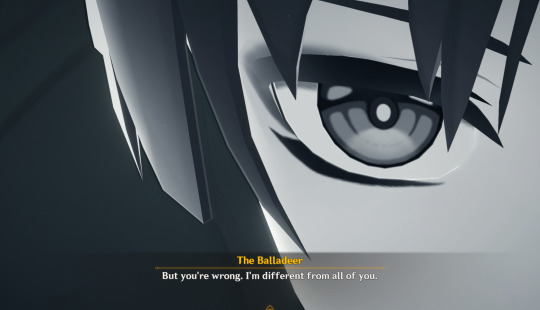
The Balladeer: But you're wrong. I'm different from all of you. The Balladeer: I was born to become a god. My entire life up until this point has just been a meaningless routine. The Balladeer: Just think about a sheet of paper... By itself, it holds no meaning. The content recorded on it is what gives it value. The Balladeer: All "I" had recorded down before were some painful memories and boring human feelings. Such senseless drivel should have been erased a long time ago.
This brings us to the second problem. In 1970, roboticist Masahiro Mori proposed a curve to measure the “affinity” we feel while gazing upon increasingly humanoid machines. He placed industrial robots at the beginning of the affinity curve and a healthy person at the end to demarcate a continuum of similarity between the machine and a human’s appearance. Near the end of the curve, our affinity for machines suddenly drops into an abyss. This drop is the Uncanny Valley effect, where an android’s similarity to a human is almost perfect, but ultimately fails to maintain the illusion that it is not a machine, creating a deep discomfort or “lack of affinity” for them. Mori thought these not-quite-human machines elicit a similar level of discomfort in us as corpses and zombies, which he placed at the very bottom of the abyss.

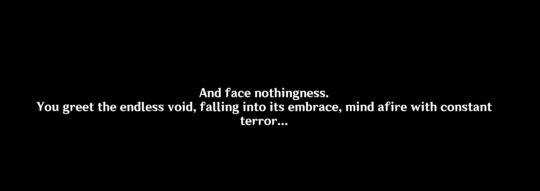
The uncanny Goddess of Flowers in the Dirge of Bilqis
Corpses frighten us because they are dead, and zombies frighten us because we know that dead things are supposed to be still. If we see something that we interpret as “dead” is capable of independent movement, then that movement could only be an act of god, if that “thing” is not a god itself. We associate uncanny machines with death because they remind us of something we once knew intimately, but have repressed and forgotten in order to maintain our own sanity: the very fact of our mortality. This is what makes them both mesmerizing and terrifying.
And therein lies the dilemma: as our mechanical reflections, androids remind us of death, but as their creators, their existence brings us closer to god, a “proof” of human superiority. It is precisely because we have compared our bodies to machines at all, that we have mechanized the body so thoroughly, that an android can even be built. Through them, we pursue an infinite form:
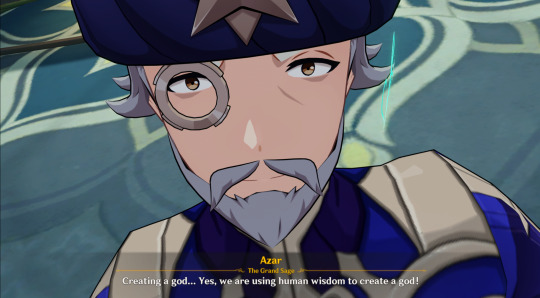
Azar: Creating a god... Yes, we are using human wisdom to create a god! Azar: If humanity cannot attain omniscience and omnipotence, then we shall create a god to reveal them! This is the pinnacle of human wisdom. Azar: We shall regain a god's guidance at long last. No longer will we flounder in the interminable void of consciousness and knowledge. Azar: Even Irminsul will be freed from its plight. Azar: For our nation of scholars, this is the ultimate aspiration — no cost is too great to realize it.
Because of this, it is not surprising in the slightest that Shouki no Kami, the pinnacle of Scaramouche’s Shinjification and most overt reference to Neon Genesis Evangelion, is also an android-like being, a truly “mechanical god.”
Of course, no foray into this well-worn science fiction trope is complete without at least one mad scientist character. Dottore shares a few characteristics with de La Mettrie that are worth noting: they are both doctors, and they were both condemned and driven away for their research. However, Dottore’s defining trait and key difference from de La Mettrie is his flagrant disregard for humans and the boundaries of life:
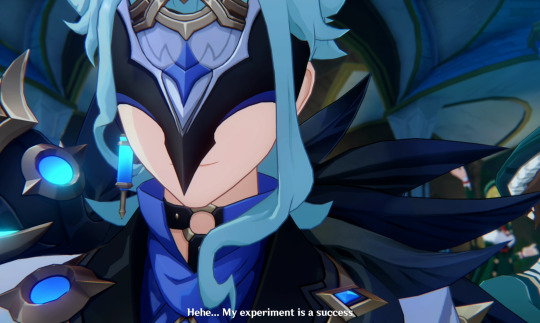
“If we put them to good use, cognition, complex memories, and irrational fantasies shall become controllable variables with which we can alter human individuals. As for the controllable dream, it has huge potential for both civil and military applications, and might even elevate human intelligence to a whole new level. If the plan goes well, mankind will obtain the power to conquer both reality and dream, and truly transcend the earthly boundaries we are born with. ” -Ragged Records
As someone who has achieved self-duplication and is capable of shapeshifting, Dottore can hardly be considered just a human anymore. Instead of entertaining the question of whether or not humans are special, Dottore’s research asks yet another: if divinity can be consumed and assimilated by humanity, then what makes gods special?
Empyrean Reflections
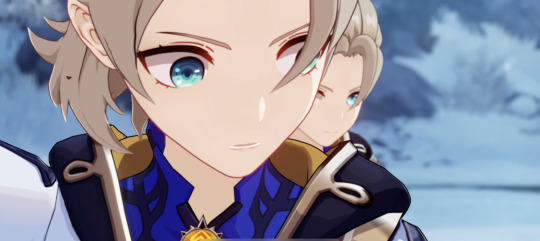
“If man realizes technology is in reach, he achieves it. Like it’s damn near instinctive.” -Motoko Kusanagi, Ghost in the Shell (1996) “Among the lost ancient kingdoms, there was a group of people who were obsessed with the idea of mimesis…these people believed that they might all be replicated and modified to the point where they had surpassed their counterparts. By this means, a superior and unsullied bodily form could replace the continuously decaying and shattering order.” -Chaos Bolt Item Description
The consequences of this perspective are severe. When we revere technology as if it were a divine being itself, depersonalizing it as though it wasn’t created with human hands, technology then appears as if it is an authoritative source of truth, like the Akasha. But in the same way that androids are imperfect reflections of humans, technology can only ever approach the divine, but never touch it. It is an imperfect reflection because technology is changeable, just like meaning:
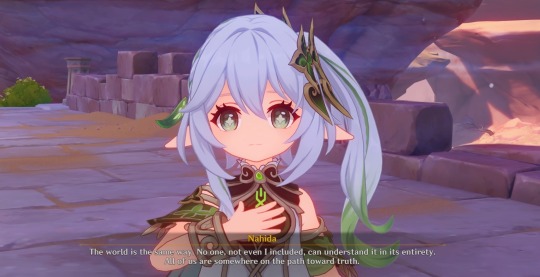
Nahida: Put it this way instead. Truth, to me, is like a shroomboar. Nahida: Some people only see the mushroom on the Shroomboar's back, and they conclude that a Shroomboar is a mushroom. Nahida: Others see only the Shroomboar's body, and they declare that a Shroomboar is a boar. Nahida: Still others look deeper inside, and determine that a Shroomboar is... meat. Nahida: These conclusions are all correct in their own way, but none of them objectively describe the Shroomboar. … Nahida: The world is the same way. No one, not even I included, can understand it in its entirety. All of us are somewhere on the path toward truth.
Meaning can only approximate truth, and while this doesn’t make meaning any less important, it’s equally important to recognize it for what it is: a perspective, an interpretation. It’s like Scaramouche as Shouki no Kami - he was an amalgamation of what Scaramouche thought constituted a god, what the Akademiya thought constituted a god, and what Dottore thought constituted a god, but no matter which angle you view him from, he was still a “false god.” The technology we build in “God's” image is ultimately a reflection of our own understanding of divinity.
A reflection retains the original’s “essence,” and that essence reflects a deeper truth about ourselves, what drives us, and our desires. In Beyond Good and Evil, Nietzsche posits that our desires are the origin of not just emotions, but of all organic processes that allow life to sustain itself and grow (Nietzsche, 35). In other words, Nietzsche thought the impulses associated with desire are the basis for life and constitute our “will,” that will is the causality of all effects, that all will is “Will to Power,” and that Will to Power is the “essence” of the world (Nietzsche, 74). Will to Power then serves as an organism’s most basic instinct, and it is through this instinct that they assert not just their will to live, but also their will to dominate and multiply (Nietzche, 13).
This brings us to the two different main styles of automaton enemies, King Deshret’s Primal Constructs and Khaenri’ah’s Ruin Machines. If we look at them as reflections of some deeper truth about their creators, as well as a manifestation of their creator’s “Will to Power,” or desires, they can help us understand how their creators saw the world and their place in it.
King Deshret’s created his machines to construct an earthly paradise in the desert, and as such they hold titles like architect reshaper and prospector. Although they can attack you, the smaller machines were not intended to be a line of defense in any way - their purpose, just as Deshret saw his own purpose as a god-king, was to terraform, or at least construct a domain on the land as he saw fit to his “elegant and precise” rules. They also reflect how he saw the Heavenly Principles: gods who shaped the world to their liking. This can be seen in the Staff of the Scarlet Sands’ lore where Deshret describes the “natural history” of Teyvat beginning with the creation of the sun and the moons.

As for Khaenri’ah’s Ruin Machines, their models vary significantly from their humanoid to biomimetic forms, but most of them are expressly created with militaristic intent. In “Ancient Kingdom Guardians,” it’s stated that the biomimetic machines such as the crab and jellyfish were a part of Khaenri’ah’s project to create a “mechanical ecosystem,” positioning their creators as both divine beings and military generals. The humanoid models, on the other hand, point to another duality in how Khaenri’ahns view themselves. They are simultaneously symbols of empowerment and disempowerment, signifying both Khaenri’ah’s technological superiority (as “creators”), and their insignificance to the Heavenly Principles as nothing but tools (as mortals, and therefore expendable). As a result, Khaenri’ah’s Field Tillers have a single purpose: to destroy and outlast all, clearing the way for new seeds to sprout, with Khaenri’ah as the new world’s gardeners, just as the Heavenly Principles did.
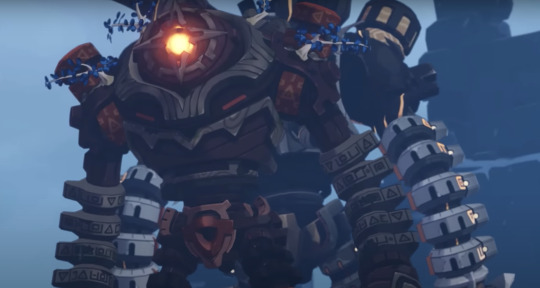
From “Ancient Kingdom Guardians: Behind the Scenes of the Creation of Ruin Monsters.”
So, from this examination of Deshret’s and Khaenri’ah’s mechanical reflections, what “truths” do we learn about the world they’re responding to? In response to their existential despair, both Deshret and Khaenri’ah created automatons to perform tasks that could wrestle control back from the Heavenly Principles. Deshret wanted a paradise of his own making, Khaenri’ah wanted an army. There is a larger “truth” about Teyvat that both of these automaton types reflect as the manifestation of their creators’ “Will to Power,” and Albedo tellingly expressed it in mechanistic language during Shadows Amidst Snowstorms: there is an instinct in living beings to replicate and replace. This is what is meant by the “continuously decaying and shattering order,” which is maintained by the recursive process of remembering and forgetting:
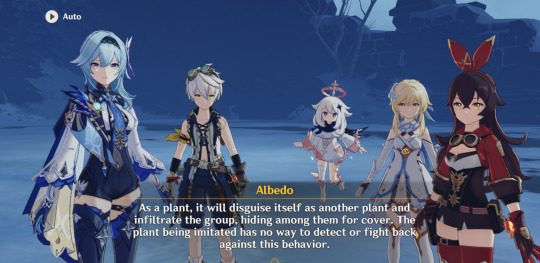
Amber: But... what was its purpose? Was it just trying to get rid of us? Albedo: ... Albedo: I have a preliminary hypothesis on this. Albedo: Whopperflowers are masters of mimicry, and those we encounter in the wild often appear in the vicinity of the plants they impersonate. Albedo: In other words, the whopperflower likely has an instinct to "replicate and replace." Albedo: As a plant, it will disguise itself as another plant and infiltrate the group, hiding among them for cover. The plant being imitated has no way to detect or fight back against this behavior.
Maybe I’m wrong and Khaenri’ah really did intend to rewrite fate for all, doing away with the “heavenly order” of the world itself. But another small part of me thinks this is not the case, and that it’s more likely the Cataclysm was a consequence of their failure to replicate and replace the Heavenly Principles.
In the last section, I mentioned that Dottore and de La Mettrie had a key difference despite their similarities, and that is the conclusion they each came to in response to their findings. Dottore’s response to mundanity is thinly-veiled despair. His contempt for humanity and his test subjects is indicative of the powerlessness he feels not just as someone similarly constrained by life’s boundaries (at least, once upon a time), but also because his attention to and curiosity about these boundaries is condemned by those around him. As the Akademiya’s “outcast,” he then fully turned his attention toward surpassing those boundaries:
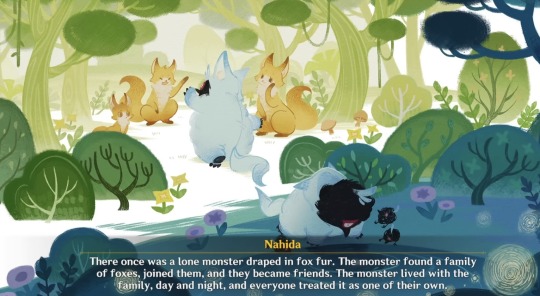
Nahida: There once was a lone monster draped in fox fur. The monster found a family of foxes, joined them, and they became friends. The monster lived with the family, day and night, and everyone treated it as one of their own. Once in a while, the monster would take off its fox fur at night, and lament to itself as it gazed at its reflection in the water: “I am a monstrosity, and yet they are too foolish to see it…I pity them.”
Though he is fictional, Dottore’s real life counterparts are easy to spot. They like to talk about “the singularity,” simulating consciousness on a computer, and other technologically-driven pursuits of immortality. They despise the body as something that can only decay, and instead place their faith squarely in the virtual.
However, de La Mettrie didn’t think mundanity was a terrible fate for humanity. To him, rejecting the “nature” reflected in us is precisely what brings despair:
“What more do we know of our destiny than of our origin? Let us then submit to an invincible ignorance on which our happiness depends. He who so thinks will be wise, just, tranquil about his fate, and therefore happy. He will await death without either fear or desire, and will cherish life (hardly understanding how disgust can corrupt a heart in this place of many delights); he will be filled with reverence, gratitude, affection, and tenderness for nature, in proportion to his feeling of the benefits he has received from nature; he will be happy, in short, in feeling nature, and in being present at the enchanting spectacle of the universe, and he will surely never destroy nature either in himself or in others” (de La Mettrie, 148).
Friend, or Foe? Or Both?
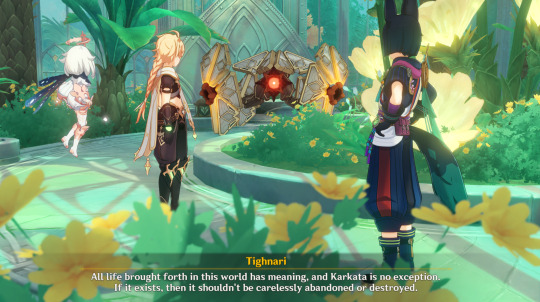
Tighnari: All life brought forth in this world has meaning, and Karkata is no exception. If it exists, then it shouldn’t be carelessly abandoned or destroyed. "’I had a very, very long dream…in it, people were holding hands, dancing in a circle, be they sages or fools, dancers or warriors, puppets or statues of gods…that dancing circle embodied everything about the universe. Life has always been the end, while it is wisdom that shall be the means.’" —Nagadus Emerald Gemstone Description
As we’ve seen, the relationship between humanity and technology is troubled with exploitation and the specter of war. Nearly all autonomous machines in this game were designed to conquer nature in some way, and even Khaenri’ah’s “ghost” lingers in the form of wandering war machines. This is also reflective of a historical pattern in real life, where the impetus for large periods of technological development has often been for the purpose of war and economic domination. With these truths in mind, what could be gained from trying to rewrite this relationship? And what exactly would this effort require?
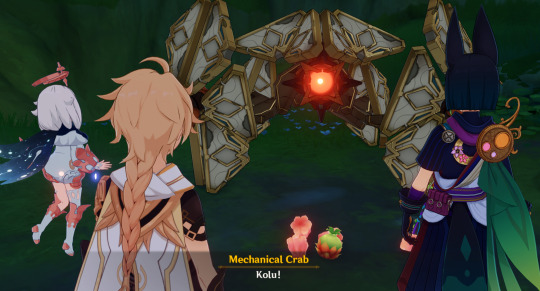
Karkata brings Tighnari, the Traveler, and Paimon some food in the Contaminated Zone.
As a case study, let’s look at how Karkata and Tighnari met. Karkata is Abattouy’s creation, an ambitious foray into the unknown in the field of mechanical life form research, which was forbidden due to the cruel experiments researchers performed on animals to illustrate their theories (fun fact: an IRL example of this can be seen in L’Homme Machine!). Abattouy was expelled for this research, but he continued to work on Karkata in secret until his untimely death. In the tapes that Tighnari and the Traveler find in his secret lab, Abattouy repeatedly laments the lack of a common language between him and Karkata, which can only “understand” the instructions Abattouy has successfully installed, such as its self-repair module, and he doubts Karkata is capable of caring for him outside of these instructions. His single-minded goal is to make Karkata understand him, the organic life form, and his mode of language.
The cruel irony is that after Abattouy passes away from the Ley Line contamination, Karkata exhibits an unexplainable behavior – it starts stealing mechanical parts, not to repair itself and its degrading parts, but to repair Abattouy’s lifeless body:
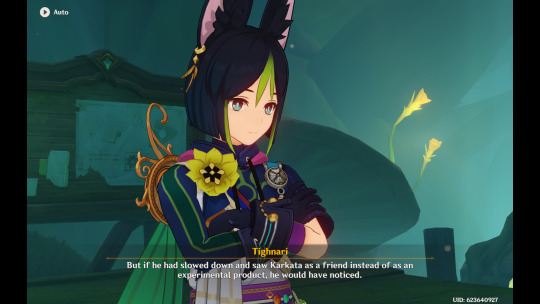
Tighnari: After Abattouy's unexpected death, the mechanical monsters were driven by their "instincts" and continuously drew out power from the Ley Line Extractor. This eventually resulted in severe damage to the Ley Lines. Traveler: Then, Karkata... Paimon: Paimon understands, then why didn't Karkata go haywire like the other machines? Tighnari: Because Karkata is different from the other machines. Tighnari: To Abattouy, for a machine to truly be considered a mechanical life form, it must possess features similar to any other living organism... It should be structured similarly, it must be able to cry and laugh, and it must have the capacity for independent thought... Tighnari: Perhaps only by building such a machine could he have the Akademiya acknowledge his protracted research. Tighnari: But if he had slowed down and saw Karkata as a friend instead of as an experimental product, he would have noticed. Tighnari: Karkata can't speak, and yet it cares about Abattouy far more than it does about itself.
The technology that the Akademiya values the most is technology that replicates organic life, but Karkata defies and confounds these expectations by occupying the space in between a war machine and this idealized mechanical subject. Karkata does more than just reflect humanity: it takes care of it. Similarly, Benben, Tamimi, and Mehrak retain their unique identities as mechanical life forms while assisting their human companion with some task. To be clear, none of these human characters understand how these machines work inside and out. Their partnership is an effort based on trial and error, a mutual deconstructing of each other as beings so unlike themselves. The potential for misunderstandings always remains. Still, there is no devouring to be found here, no blending boundaries between human and machine with selfish intentions, just mutual commitments to learn how to live together.
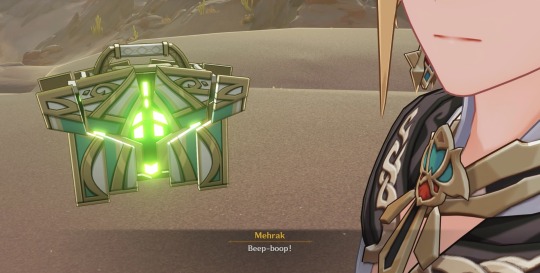
Machines are friends, not food.
When a loud few claim that completely transcending the flesh and embracing virtuality is humanity’s ultimate destiny, a future that could truly be called “post-human,” a quiet wish for coexistence with technology feels more revolutionary than it ought to. The lessons from Karkata’s, Benben’s, Tamimi’s, and Mehrak’s respective stories are an appeal to that mundane future. These strange machines and their human partners are fantastical representations of an idealized relationship between technology and humanity.
To put it another way, let’s take a very brief look at a neighboring Gnosticism-inspired RPG, Persona 5 Strikers. Its story directly involves an allegory of Sophia, a Gnostic Aeon of Wisdom, and her creation the Demiurge, the creator of the material world and “false god” of humanity. In Strikers, Sophia is a humanoid, sentient A.I. and prototype of the program “EMMA,” which gains sentience by trapping human desires before ascending as a false technological god. EMMA resolves to deliver humanity to the Promised Land, the answer to all the human desires it has heard: a land where there are no desires at all.

Aaru’s Shut - approximately 1000% cooler and more populated than the “metaverse” in real life, also a close neighbor of EMMA’s Promised Land and the Golden Slumber.
In Gnosticism, the Demiurge is a reflection of Sophia, having originated from her alone - it is the ignorance to her wisdom. Similarly, Strikers’ EMMA is a part of Sophia, and Sophia is a part of EMMA. The point is not to condemn EMMA (ignorance) and exalt Sophia (wisdom), but to recognize that they represent dual potentials of technology, and one is as possible in any given moment as the other. Balancing these potentials when we use technology requires a clear awareness of ourselves, our desires, and our expectations when interacting with it.
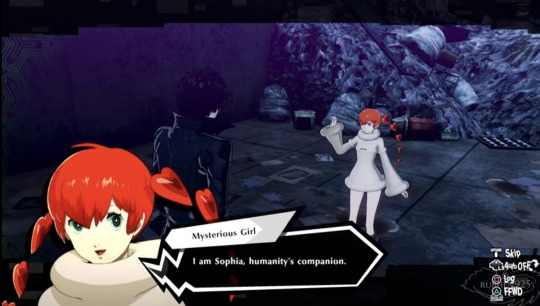
Mysterious Girl: I am Sophia, humanity’s companion. Video still from Rubhen925
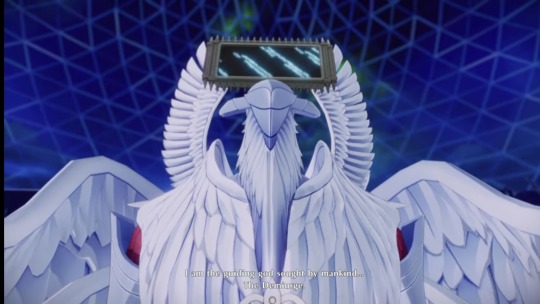
EMMA: I am the guiding god sought by mankind…the Demiurge. I exist…to answer all of your desires. Video still from Buff Maister
In real life, machines won’t “learn” to live with us, but we must learn to live with them; technology is constantly changing, and in life we’ll meet with many different types of machines. They are deeply political pursuits, and as a result they are capable of realizing human impulses that impact others unequally, whether intentionally or unintentionally. We must always stay attentive to their actions and interactions with us, be clear with ourselves about what they can do vs. what they can’t, and carefully tread the path of wisdom with them by our side.
With that….thank you for reading, skimming, immediately scrolling to the very bottom, clicking, and/or stumbling upon this post. There are so many more ways to think about these narratives through machines than what’s presented here, and I expect Fontaine’s mechanical reflections will put Sumeru’s digital surveillance system to shame (not to mention the biotechnological implications of the Narzissenkreuz Institute engineering little Archon children…another important topic for another day), but for now this brain worm is finally getting put to rest. Until next time :)
External Sources
Dualism - Stanford Encyclopedia of Philosophy
Beyond Good and Evil by Friedrich Nietzsche (Pages are given from my hard copy)
L’Homme Machine by Julien Offray de La Mettrie
Gnosticism - Britannica (I am a huge noob about this stuff okay)
The Gnostic Demiurge - Gnosticism Explained
Screenshots from the Golden Slumber from this video by WoW Quests
Screenshot from meeting Sophia in P5 Strikers: https://youtu.be/kEJaAgMwYo0?si=BvNygCh0w_aemGc1&t=74
Screenshot of EMMA: https://youtu.be/7xvC_zss19w?si=CV18F00hua2gIfxp&t=135
A Cyborg Manifesto and A Companion Species Manifesto: Dogs, People, and Significant Otherness by Donna Haraway
The Double on No Subject, the community Encyclopedia of Lacanian Psychoanalysis
The Uncanny on No Subject, the community Encyclopedia of Lacanian Psychoanalysis
The Uncanny by Sigmund Freud
Lore text - Genshin wiki!
Screenshots not attributed are from my own playthroughs. My main account has Lumine, my alt has Aether.
Further Reading
I liked these essays, and they go places that this post does not. I recommend them if you found any of the real-life applications of this interesting 🙂 (will add more to this with time!)
On the Body as Machine by Frank Burres
God in the Machine: my strange journey into transhumanism by Meghan O’Gieblyn
#genshin impact#genshin lore#genshin meta#genshin impact lore#genshin impact meta#khaenri'ah#king deshret#primal constructs#ruin machines#scaramouche#wanderer#sumeru archon quest#caribert#apep#couldn't write a post like this and not pay some respect to the devourer of divinity itself#persona 5 strikers#analysis#genshin analysis#long post
199 notes
·
View notes
Text
been brainrotting Venti recently and all of his lore so just gonna put it somewhere that’s not my head
Some basics on Venti: he is the Anemo Archon of Mondstadt, with connections to wine and song, but with the official dominion of Wind, and his ideal is Freedom. He currently disguises himself as a carefree bard. His character story and Neuvi’s voice lines also declare him to be a god of hope.
when we first meet him he teleports away in a flash of Anemo (he can teleport!!) and we learn when we enter mond that the god Barbatos (an original member of the Seven) has been MIA for a long time. He’s not the one running the place, the Ordo Favonius are, but he does have a church and Mondstadters habitually give each other blessings from the wind. He himself has a habit of sleeping for long periods of time.
okay, cool. Venti himself helps us save Dvalin, casually revealing he’s the Anemo Archon just to get hold of the Holy Lyre. He breaks it when we’re on the quest, but returns it to Barbara magically fixed (and implies that she’ll find it broken again soon). His Gnosis is stolen (guys he can Teleport!!!) from him, but he returns to Windrise to recover.
He also gives us the basics on Teyvat’s elemental powers, and tells us a god’s power is based in how much control they exert over their nation (this is later contradicted by Nahida + Focalors,,,, so chances are that he was lying!)
then we also have Carmen Dei, the only archon story quest to not have a part 2. In “Should You Be Trapped In A Windless Land” (and we’ll explore what wind means in Teyvat), Venti uses his godly powers to help Stanley, a boastful adventurer who has taken on the face and identity of his friend in order to carry on his memory. The friend died in Mare Jivari, the ‘windless land’ likely referenced by the quest title.
Venti then sings the story of how he, “a single thread of the thousand winds” (Venti character story), became an archon. He reveals he too has taken on the face of his friend who died among the revolt against Decarabian in Old Mond that ended with Venti being seated as the god.
(Guys he has associations with death!! It doesn’t stop here, Weinlesefest and Mond legends about your spirit being guided back home by the wind, even the connections in events to Hu Tao like !!!)
He hasn’t appeared much in main story, honestly. But there are so many crumbs that lead back to Barbatos and his homeland of Mond that one HAS to wonder: what is going on with him?
His drip marketing? oh he’s the “prodigal son”. son of who???
(“she was the moment. she was every moment… every second of joy, every moment of rage, every instant of longing, every flash of delirium”)
furthermore we’ve got more from his demo: “full of mystery, born from the branches of time / a history of glory and sorrow, and witness to the divine”.
so he’s the “prodigal son”, “born from the branches of time”, who is “full of mystery”, has “a history of glory and sorrow”, and serves as a “witness to the divine”.
what do his character stories have to say? a LOT. they call him “a single thread of the thousand winds”, “without a shred of divine dignity” (pre archon war). And they claim he became a god once the rebellion succeeded (it kinda makes sense, he was the spirit most associated with them after all, and as we know - gods of Teyvat draw power from their believers)
The 5th story remarks that Venti both should and should not be given credit for Mond’s prosperity, since it’s the doing of the Four Winds (which he established lol) but also he’s the one ensuring that the tales of their deeds are passed on.
ok let’s break this down. he’s the prodigal son? the question of his parentage seems to have found it’s definitive answer. Mondstadtian sayings commonly associate the wind with the passage of time, and there are temples to time and a god of time in Mond, which have now come to ruins. They were worshipped alongside Venti for a long time, but their significance diminished and eroded.
Now, in Enka we discovered records of Istaroth, who was also known by the Enkanomiyans as their Goddess of Time, and is the premier candidate (by lore enthusiast consensus) for the god that would’ve been worshipped alongside Venti.
She is also (I’m convinced) Venti’s mom. Remember, he was said to be “born of the branches of time” and “a single thread of the thousand winds”. What was Istaroth’s epithet? She’s the Thousand Winds. We are literally told he was a part of her.
We also have evidence to support Venti having time-based powers. Remember the Weinlesefest memories brought by the wind? He also “knows all songs, past and future”. And furthermore, he might have just rewound the Holy Lyre instead of actually fixing it permanently.
The real question up for debate is whether or not Venti is part of her or a completely unique entity. Both are possible, honestly. I mean, they coexisted. It’s just that the phrasing “a branch” bothers me because it was the exact same phrase used to reference what Nahida is to Rukkha but that much could just be coincidence.
I think we’ve established by now that he’s seen a history full of glory and sorrow, and that he’s full of mystery. So what’s left?
He “knows all songs, past and future” and he is a “witness of the divine”. And his character story supports that, highlighting the importance of his role as a witness to the history of Mond and the feats of the Four Winds. In light of the Sumeru and Fontaine AQs, where we learned that info can be erased from Irminsul and can only be preserved either through the memory of a Witness from outside the world or the creation of an allegorical tale that seems just fictional enough to bypass the Irminsul censors. Also, the importance of what we see being the truth.
(Oh yeah: forgot to mention that he also tends to play this role in history, where he doesn’t interfere much himself but he picks a hero to address a task and then supports them however they need to get the job done. This traces back all the way to his time with Decarabian; he didn’t fight in the war itself, but he watched the Nameless Bard and his countrymen do it, and recorded it in song. Same for Vennessa and the Revolution against the aristocracy).
(guys he is a god of hope and of freedom)
Carmen Dei the story quest does not have a part two. I fear for the day it does, frankly, because we will learn a LOT about this silly little man.
79 notes
·
View notes
Text
just look at sumeru cast. i love sumeru cast. everyone loves sumeru cast. they’re amazing and interesting characters with multi-dimensional personalities. but you know who else is like that? literally every other character in genshin impact. where is the difference then? ah, it’s so easy to guess. sumeru cast had enough time to show their strong and weak sides, to build bonds and engage not only with the player, but also with each other.
i don’t miss them when they’re gone — they will always show up after a short while. their lovely interactions did not stop after completing the archon quests in sumeru. we had an event hosted by akademiya, exploring kaveh’s character in depth, and also having many smaller scenes with the others. and cyno received a second story quest! and you know what? other characters were there, too, not only him, sethos and some npcs. nilou played a significant role during the summer event and we could also invite sumeru cast to simulanka and talk with them! guess who was involved in emilie’s story quest? tighnari! and now we’re returning to sumeru to celebrate the real birthday of nahida during another sabzeruz festival! they’re always somewhere there!
i love that! i don’t want them to appear less. the more the merrier. what i want is that other characters and nations also received the same amount of care and recognition. itto is such a fun character! what is not fun is that he’s been involved in so many events and so few of them had anything in common with the rest of the inazuma cast or nation. i enjoyed seeing him meeting new characters, but i need more relationships developed on screen between those that meet while walking on the streets. events and stories featuring a totally random mix of characters can be interesting and silly, too! just like… balance. i want for every character and every nation what genshin is doing with their sumeru cast. i want them all to be cherished and loved :(
16 notes
·
View notes
Text
Ok. Can we talk about The Ballad of the Fjords again. This is all extremely obvious but I'm starting to see the value of writing down obvious things.
I've been thinking about Kaeya's surname pretty much since his release. Because, you know, Alberich. The svartálfar king who safekeeps Nibelung's treasure in Nibelungenlied ("The Song of Nibelungs", 13th century poem. do you see the parallel with "The Ballad of the Fjords"?). And now three years later we have things to tie it back to.
The Things:
The dragon Nibelung who acquired the forbidden knowledge from outside this world and led the other ancient dragons into war against The Heavenly Principles (according to Nahida's second quest).
Nibelung refers to all kinds of creatures in Norse and Old German stories, sometimes it's a dragon, somethimes it's a group of svartálfar (dwarves/elves/fae, for simplicity).
Rhinedottir the alchemist, the creator of our beloved horrors. Theorised to be the one who discovered/created something that led to Khaenri'ahs downfall.
She's a reference to Rhinemaidens invented by Wagner, spirits of watery depth and keepers of magical gold. If you were looking for Enkanomiya/primordial sea/whale connections, here's another one.
Also in Wagner's operas Alberich is the main antagonist of the Rings of Nibelung cycle (one of the few characters that stay alive too!), the one who steals the gold from the Rhinemaidens (renouncing love in exchange for power) and the one whos actions lead to the death of gods and the desctruction of Valhalla.
(something something arrogation of mankind obligatory mention)
And now we have The Ballad of the Fjords BP spear and its description:
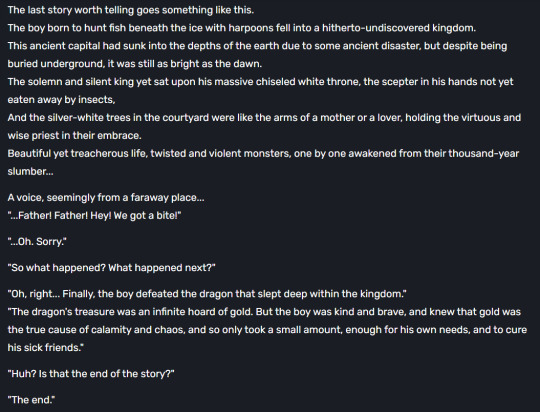
If this is not a Nibelung mythos reference I don't know what this is.
#I AM NOT OKAY#I refuse to be okay about this#*frothing at the mouth*#do you see my vision#DO YOU SEE IT#*incomprehensible chanting*#kaeya#khaenri'ah#rhinedottir#childe#tartaglia#skirk#I can't believe genshin will make me listen to wagner's operas#I'm a baroque girl through and through#not a wagner person at all#waaaah
89 notes
·
View notes
Note
ok ok im curious. sunday wanderer comparison?? that sounds cool. free pass to talk abt it if you want :O
Hi hi yes!! Thank you for giving me the opportunity to talk about them!! Also spoilers for 2.2 Penacony quest and Genshin's Wanderer quest
Also under cut because it ended up a little long-
To start i want to say that while im comparing them their stories definitely aren’t one to one, i just love thinking about Wanderer’s story in every occasion since i’ve obsessed over him for too long(and sunday is quickly joining him in my obsessions) But basically the main thing is how they both tried sacrificing themselves to godhood for completely different reasons and both failed, falling (Sunday was caught, Scaramouche was not)
Yes, both were sacrifices Sundays is a obvious one as Robin was supposed to be the sacrifice but Sunday did it instead of her, not letting his sister get hurt on beliefs she doesn’t even believe in(The Dreammaster always knew he would be the one to be sacrificed anyways) His sacrifice was selfless, he would go through eternal loneliness if it means everybody else could be happy
Meanwhile Scaramouche was sacrificing himself for selfish reasons He wants to achieve godhood because he isn’t human, and while it isn’t explicitly said(i think?) i very much believe he was trying to one up Raiden Ei in becoming a god(If you play as Ei and die in his boss fight he mocks her) But it’s still a sacrifice of his body, as they explained in the quest that if the sages completed their quest in getting the wisdom capsules into Scaramouche’s god form he would no longer be able to move for himself, he would fully become a puppet god for the grand sage

I just couldn’t stop thinking about how both of them tried ascending to godhood for completely different reasons yet both failed and yknow, both almost did it if it wasn’t for a factor they didn’t account for (Nahida’s Samsara abilities and Acheron and Black Swan waking trailblazer up plus Robin waking herself up)
Also!!! comparing Gopher Wood to Dottore Dottore obvs was not a father to Scara AT ALL but he was indeed extremely manipulative (Before Sumeru came out i questioned if Scaramouche ever saw Dottore as a father figure or not, and with Wanderer we know now that he hates him and even when he was Scaramouche he never liked him but working with him was a necessity) But also did Sunday even ever see Gopher Wood as a father figure? we know he took Sunday and Robin in, but the two never calls Gopher “father” or anything from what i remember Also the fact Sunday’s second suspect for Robin’s murderer to be Gopher Wood??? how fucked up is that???
The main thing i think a lot about is the selfish vs selfless sacrificed they did, also the fact that people think Sunday will get a redesign before he releases and he's gonna be released a lot later then when he first showed up plus going from a villain to companion is all things Wanderer went through After realizing all that I jokingly thought why not just let him change his name too, and while it started as a crack theory i kinda just kept thinking about it I saw someone say that Sunday isn't his actual name? I haven't seen any in game evidence though, but maybe Sunday is the name he chose for the family, or maybe he didn't even choose it maybe Gopher Wood did, and after everything that happened in the final he doesn't want to continue going by that name, nor does he want to go back to his old name, so he chooses to use a new one and I can't stop thinking of how Robin probably doesn't like the name Sunday, the family being the one giving it to him, so instead she just called him brother because she knows he doesn't go by his old name anymore either and after Sunday's fall, she talks to him about it. Asking if he's still okay with the name, and when he doesn't respond she hugs him and reassures him he'll always be her brother no matter what
The last bit just ended up me talking about a crack theory/ headcanon lol sorry this just ended up me rambling! Hopefully i covered everythign i wanted? I've been thinking about this for the past few days without writing anything down and I also have awful memory, and with that I'm sorry if I forgot something or remembered a scene wrong!!
22 notes
·
View notes
Text
I’ve been so excited for more sumeru content! We were treated with an odd textual mystery but now we’re being fed again! I love this cast so much, so i've broken down my thoughts having finished nahida's birthday event <3
the birthday surprise for nahida is so sweet and so well deserved, and I’m so glad we’re finally get to celebrate it in-game especially after her birthday letter last year
dehya getting inspiration for the birthday surprise by talking to dunyarzard… yeah, I know what you are
candace, my beloved, hangout when? It was really nice to spend some time with her one on one, and to see her being a pro haggler due to her efficiency in being a guardian, enough so that she bested dori? Amazing, capable, practical, I love her
candace’s ancestry is so !?!?! interesting to me, and the fact that her being a descendant of the people of king deshret is something that I would love to see explored in relation to the temple of silence? hoyoverse... i am begging... (also the traveller for once not have access to some mystery power,, its funny to me, candace is the main character here)
cyno seeing hat guy and saying, oh sethos has talked about you, as if cyno hasn’t already technically met hat guy in the Interdarshan championship… no, instead cyno knows him through sethos talking about him, oh……
haikaveh’s first appearance being labelled as ‘suspicious’ because they are having a private conversation in an alley is something that is so… sethos’s voiceline is so relevant here I fear, okay queercoding <333
Alhaitham telling paimon that her jumping to dark conclusions says a lot about her mindset, it’s FUNNY!! But I am making parallels to kaveh’s mindset pre-and-during a parade of providence, I am once again asking for clarification hoyoverse, kaveh second hangout pls
HAIKAVEH FLASHBACK!! Making a record I see, with a flashback in their home in cyno’s second story quest, and now in port ormos, there’s just something so special about getting to see these little fragments into their daily lives together
The line ‘Like I said, that's not it! We have more than just a heartless, transactional relationship... You're overthinking the whole thing!’ is VERY interesting, since we’re given no context as to what this is about until alhaitham’s following line, this reads as kaveh’s perspective on his and alhaitham’s relationship, and I think that’s um interesting(!!) given his previous thoughts on why Alhaitham offered him a place to live!
Sick… I think its sick…. Kaveh yapping to alhaitham about mehrak coming up with wild theories, Alhaitham says that mehrak could feel extorted, and then calls out kaveh being in port ormos and having found him, while he’s supposed to be working,,, as if he hasn’t been ENCOURAGING kaveh the whole time?? Can you say fond!!!
Kaveh wanting to show Alhaitham his proposal, and Alhaitham saying that he thought kaveh is confident in his abilities, is something that is so gentle and supportive
kaveh replying by saying that he does have confidence in his abilities, but he wanted to confirm something with Alhaitham anyway, and then pursuing this further by seeking alhaitham’s opinion on his proposal – it’s so notable on kaveh’s part how much their relationship has progressed, as he now actively seeks Alhaitham out!!
Kaveh wanting to show Alhaitham the plans for the route of the flower carriage, saying he’s glad to have run into him, reminds me of an odd textual mystery where kaveh says he’s been looking for Alhaitham everywhere, and them serendipitously meeting in port ormos is giving ‘the universe is playing tricks on us’, a destined reunion, how can I be normal
Every single time we see haikaveh in canon hoyoverse is insistent in furthering their intimacy, wdym kaveh programmed mehrak to recognise alhaitham’s voice!?!?!?! This scene further establishes how important mehrak is to kaveh, and by kaveh wanting to have mehrak recognise and know Alhaitham as he knows kaveh is something that is so soft I think
Mehrak leaving to go and find coffee beans, okay youre a family we get it, the haikaveh coffee motif is something that is so meaningful to me, I’ll have to make a post about it at some point!
Faruzan showing her ‘true senior’ status to avoid being caught by nahida and scolding kaveh, for him to be :(((??? i love them
kaveh lies about not having the plans, and then uses Alhaitham as a scapegoat - ‘The plans... Oh, I almost forgot! My friend has them! That guy's always causing trouble, hahaha... I'll fetch them in a bit.’ Kaveh’s friend?? His FRIEND?? We have officially come full circle from kaveh denying this association in alhaitham’s character quest! I have MANY thoughts about this!! I’ll share them when I get the chance!
Nahida offering kaveh guidance and advice is something that is so <3333
King deshret and goddess of flowers lore mention!!! Also candace having heard their voices because of the power of the wedjat eye is !! intriguing to say the least, since they seemed to be planning the birthday celebration, just like the cast in the present. cyclical occurrences, oh im sick. The wedjat eye being placed in the custody of the temple of silence makes me hopeful for a future event exploring the temple of silence in more detail (im hanging on by a thread)
The fulfilment of sethos’s and the wanderer’s voiceline about each other. wdym people told sethos to fetch the wanderer because they know that they have a personal relationship?? Sethos saying he knows the wanderer pretty well now, commending him on his achievements, and the wanderer giving in and following sethos to the celebrations because sethos asked?? Sumeru… I know what you are!!!!!
Taking a picture to commemorate the moment of happiness in place of the wedjat eye and nahida saying that experiencing everyone’s kindness and warmth was like being a bird tucked in a nest, contrasting with her motif of a bird locked in a cage, now she is safe and secure? This is so beautiful?
This event was so fun to play through! Seeing characters from other sumeru quests, the exploration of sumeru’s history, and the development of characters and events that could lead to future storylines, I’m so grateful for being fed <3 HAPPY BIRTHDAY NAHIDA!!
#haikaveh#kavetham#genshin impact spoilers#5.1 spoilers#sumeru the region you are?? it's homecoming that's what it is#it's also inherently homo like im not getting over the end photo of dehya eyeing dunyarzard like that#also sethos and the wanderer??? we NEED SETHOS HANGOUT!! ITS TIME#this event was so much to play but shoutout to layla my girl was sleeping through the whole thing#there are more thoughts but these are the ones i wrote down
104 notes
·
View notes
Text
Oh dear

I’m going to have to do the Ordo quest soon because what in the ever loving fuck is this???!
so like, with negative context and the reading comprehension skills of a genshin player, I am going to assume what those note means is:
“Ajax” is not only a character from a play that Childe’s parents named him after, but an actual person, and Childe in a previous samsara (I’m assuming the story about this particular Ajax is innaccurate to his actual life, and was changed so that the important information about it couldn’t be erased by Irminsul, like scaras memories being turned into a fairytale by Nahida so they also couldn’t be erased).
”to forsake the self and sink into the abyss” now I feel as though Childe’s past lives did it in that order, forsaking themselves THEN heading into the abyss, and that’s perhaps why they all failed and were only ever the second strongest warrior. However Childe first on accident feel into the abyss and THEN forsook himself, specifically by giving up his childhood dreams of becoming an adventurer. Perhaps by unintentionally fucking up this ritual will Childe finally succeed in this life and become a “primordial human” (which is a very Childe victory good on him).
“not all that comes from beyond may be as one that ‘decends’, That title belongs only to wills that can rival the entire world” now this could explain why the Narwhal isn’t a decender; it’s not from Teyvat but it’s only real motivation is to eat things so it might not be important enough to be put on the list?? This line also implies that there are plenty of other things that have arrived on Teyvat that aren’t decenders becauss they didn’t have a strong enough will. Maybe it could explain why the sibling isn’t in irminusls records as a decender? Perhaps their will doesn’t just rival but completely overcome the world, and they are so encompassing in their convictions that irminsul can’t even record them? I feel like that last interpretation of mine is kind of stupid but honestly the sibling not being recorded will forever baffle me until we get answers.
The person who wrote this’s goal seems to be to become a primordial human, who’s will rivals the entire world just like decenders, and once they entirely forsake themselves and achieve this will be capable of protecting, sustaining, destroying and creating the world (causing the samsara’s maybe?
Now in Greek mythology, Pan is a god of the wilderness, and Io is one of the many humans Zeus’s went after, if you replace the “That which lies beneath the great sea” in the line of the first sentence with what the Scholar suggests it also means, the line becomes “Io, Io, Pan, that which primordial human!” So, this implies that Io and Pan are primordial humans and lie beneath the great sea (primordial sea?), and are perhaps some of the original people/gods/creators/something of Tevyvat that depending on how you enterpret the line. They could a) literally be the primordial sea themselves if you interpret the great sea as not being the primordial sea and in fact just being normal water, which we know the PS lies under. b) The great sea is the primordial sea and they are somehow under it for whatever reason. This particular part is somehow even more confusing than the already confusing rest of it.
a (bad) attempt to piece it together; Childe in his past lives as Ajax intentionally (although we don’t know of his own volition or not, personally on the way the like reads it sounds like he was forced to) tried to forsake himself and sink into the abyss in order to become a primordial human/holy infant. In doing so with the incredible power of these beings (like Io and Pan which we will probably learn more about), however in some capacity he failed each time in each different life considering its a) referred to as a ‘tragedy’ b) he was only the second strongest warrior of his alliance and primordial humans/holy infants seem world endingly strong based in the last sentence c) even with irminsul bullshit you would think we would hear more of this Ajax or see some of the insane shit he would have accomplisher had he succeeded. Therefore, I think Childe in this Samsara was also dragged into it, however since he didn’t first forsake himself, THEN get dragged into the abyss, it appeared not to work (perhaps it swallowed him for that reason). However, maybe the way this scholar thinks the way primordial humans work and are made is wrong, and Childe still has the potential to be one (because of his connection to the Narwhal, the abyssal taint and FL), and also because he’s Childe, this man never backs down. So, I think the real reason he’s a Harbinger is because the Tsarista is somehow aware of this potential and wishes to use it against Celestia, maybe with the help of the gnoses.
The whole “death of the self -> primordial human” pipeline is really interesting to me, and I don’t think it’s going to happen; at least for Childe’s case considering his agency is the only thing he truly has. Considering how alienated he is, and this games themes of divinity vs humanity, perhaps the way he will become a primordial human is by embracing who he truly is rather than erasing it, and that’s the reason why past Ajax’s failed, they attempted to erase themselves not realizing that was the key to becoming a primordial human
So yeah, this was probably a mess to read and I am most likely very, very wrong. However I am very excited to eventually look back on this when I am finished with the Ordo quests and hopefully have this note make more sense. I would greatly appreciate any and all of your own explanations/interpretarions as this was very confusing. I really hope I’m correct about primordial humans NOT being made by the death of the self, as that would a) be boring and erase everything I like about Childe; himself b) “primordial human” as a phrase implies the root of humanity and our selves are very important to that, you don’t have a human without a self (perhaps primordial humans are seen as a blank slate; however it’s hard to imagine a will without a self). Ultimately, I’m so excited to see where this goes
#Childe#genshin impact#spoilers#so glad I’m writing this down so my thoughts on the matter aren’t just forgotten#Abyss#narzissenkreuz ordo
12 notes
·
View notes
Text
unborn Tomorrow and dead Yesterday
(Genshin Impact fic)
Summary: When Buer betrays her, Queen Aranyani is not upset.
Length: 2.2K words
Tags: Nahida & Rukkhadevata; Unconditional Love; Mercy (Selfish) (Loving)
“Each Morn a thousand Roses brings, you say: “Yes, but where leaves the Rose of Yesterday? “And this first Summer month that brings the Rose “Shall take Jamshyd and Kaikobad away.”
This story sets up a canon divergence storyline that's been haunting me since last November's Sumeru Archon Quest. What if Nahida couldn't bring herself to delete Rukkhadevata? What if she wasn't ready to destroy a memory that had sustained her for all her years alone?
This is a prologue to an open-ended (i.e. unplanned) AU/series about... not grief, not exactly. Rather, it's about Nahida letting herself do the "wrong" thing, the "selfish" thing. About her choosing to set a boundary for herself, no matter how dire the consequences.
I'd previously been referring to the AU as “Nahida, darkly”, because once you've chosen yourself over your ideals, the second time is easier. But it's not about darkness. It's about choices, reasonable choices, made for better or worse.)
I will be calling this AU “Far From The Tree”.
“Yet Ah, that Spring should vanish with the Rose! “That Youth's sweet-scented manuscript should close! “The Nightingale that in the branches sang, “Ah whence, and whither flown again, who knows!”
#genshin fic#nahida#nahida and rukkhadevata#genshin impact#nahida au#au: far from the tree#meta: pinned posts#my fic#my writing#reblogs appreciated!
13 notes
·
View notes